#still 2gether
Text
Fun Fact: If you like the cinematography of Moonlight Chicken Only Friends, it's because it's the same cinematographer who is behind ALL of your favorites:
Rath Roongrueangtantisook
Only Friends
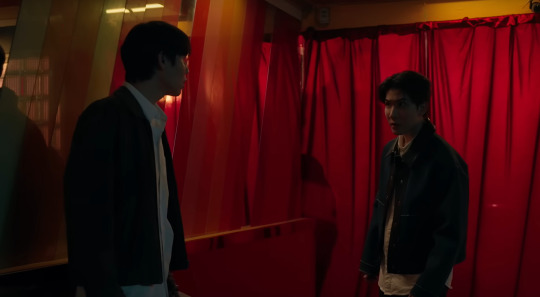
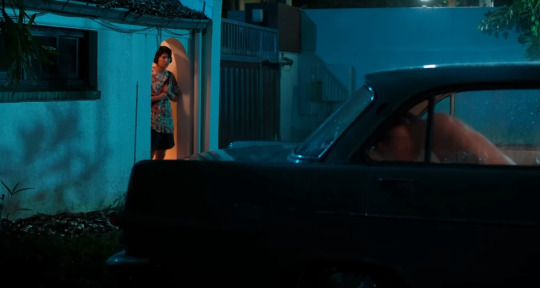
Moonlight Chicken
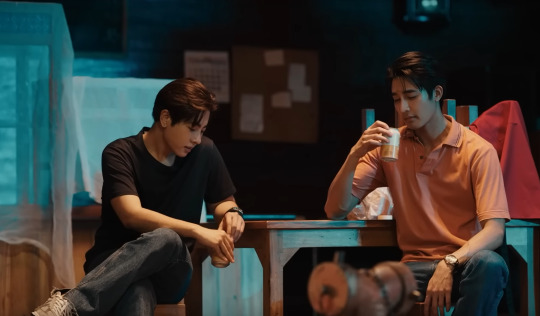

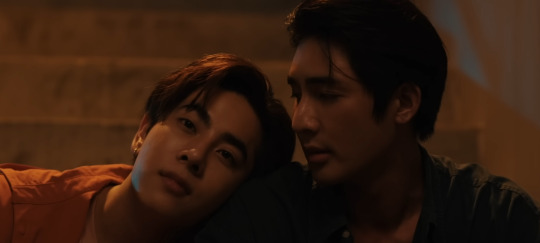

Never Let Me Go

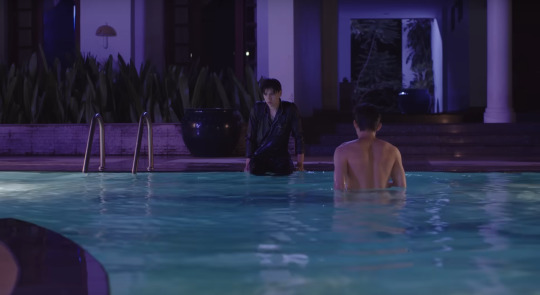
Mama Gogo
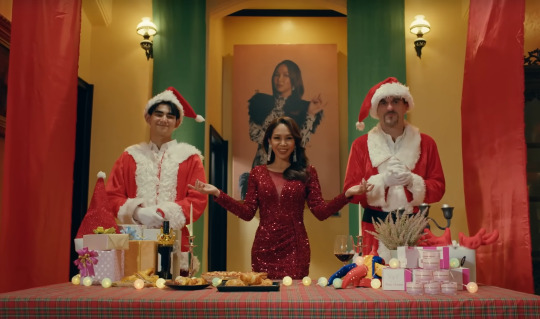

A Tale of Thousand Stars
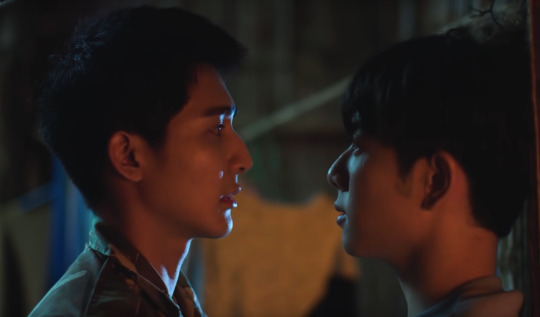
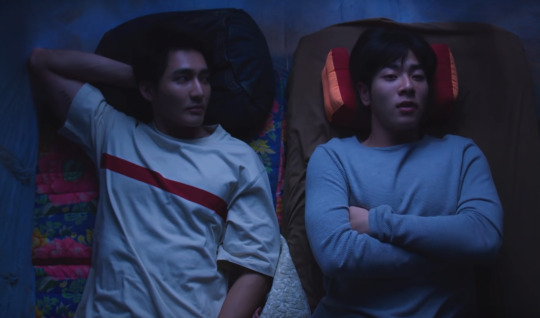
Dark Blue Kiss
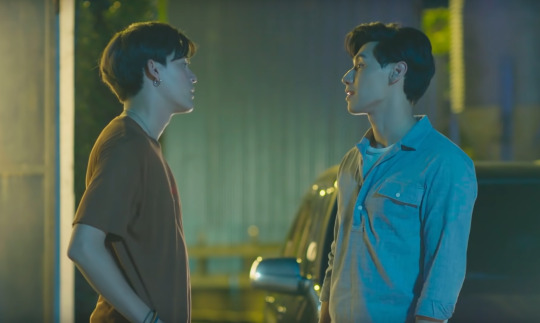
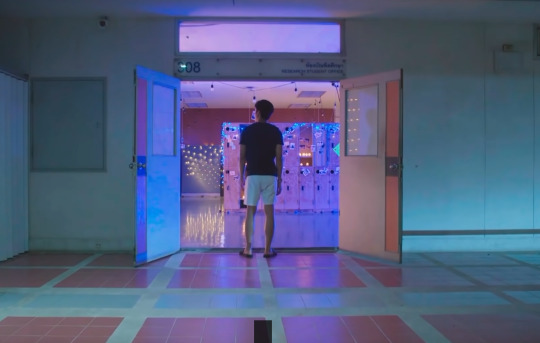
3 Will Be Free

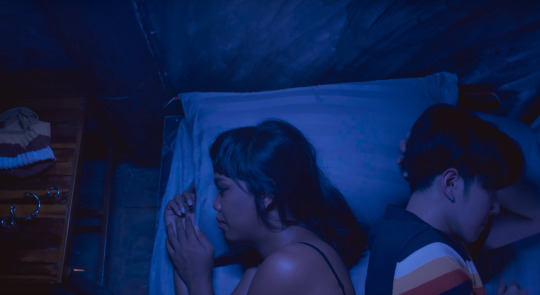
He's Coming to Me
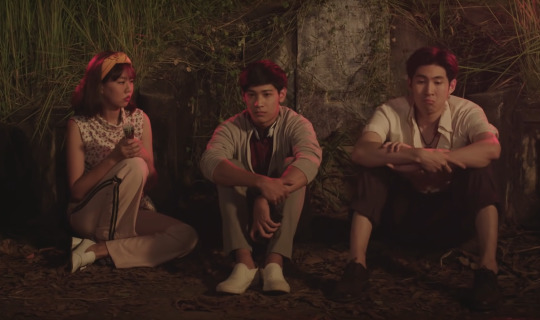
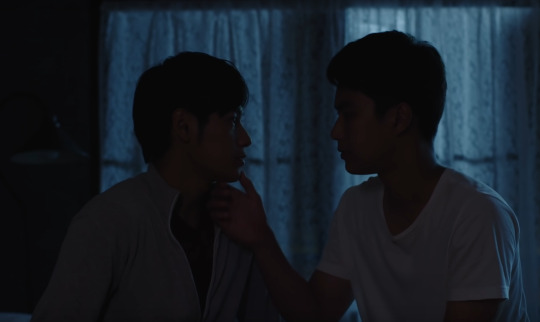
Still 2gether

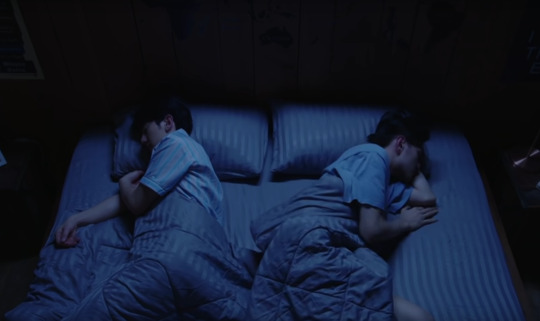
Friend Zone & Friend Zone 2
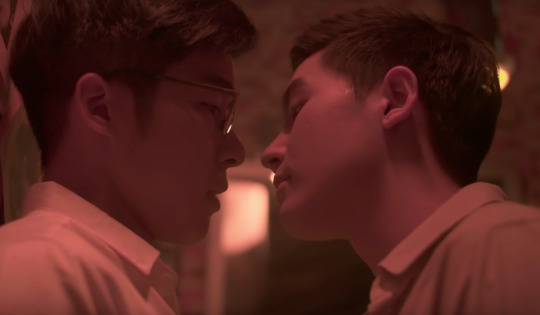
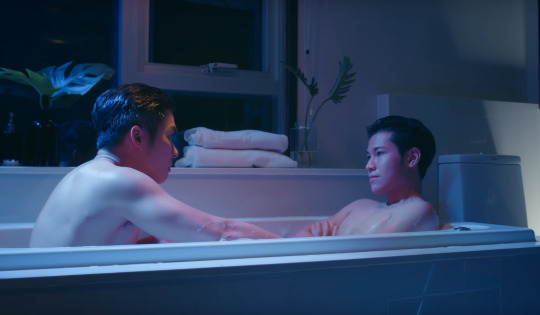
Our Skyy
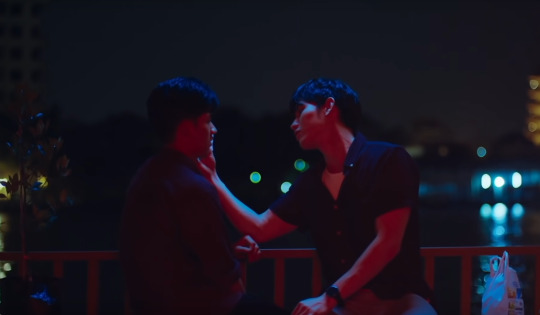
His skills are aging like fine wine.
#Rath Roongrueangtantisook#the cinematography#Only Friends#Moonlight Chicken#Never Let Me Go#Mama Gogo#A Tale of Thousand Stars#Dark Blue Kiss#3 Will Be Free#He's Coming to Me#Still 2gether#Our Skyy#Friend Zone#Friend Zone 2
806 notes
·
View notes
Text

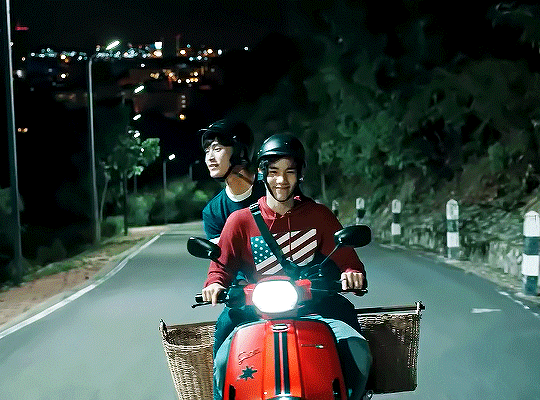
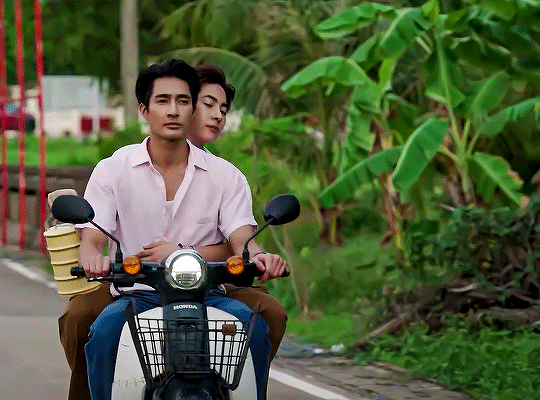

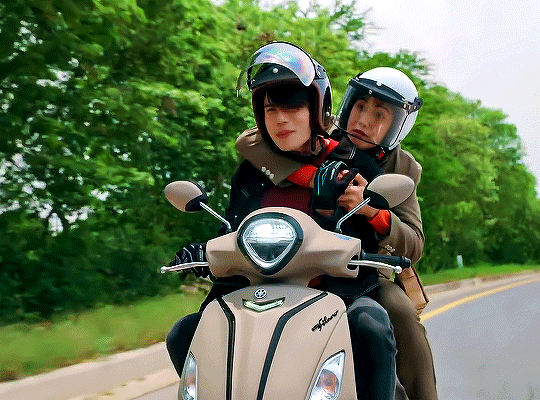
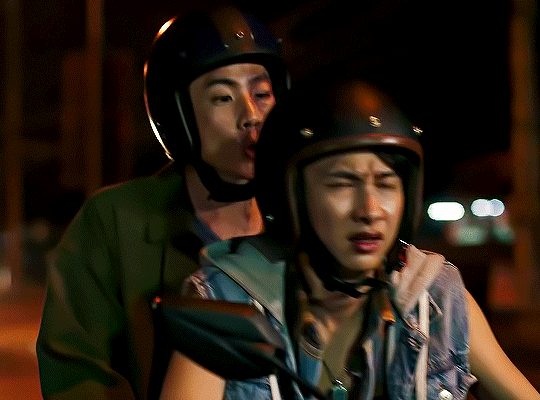
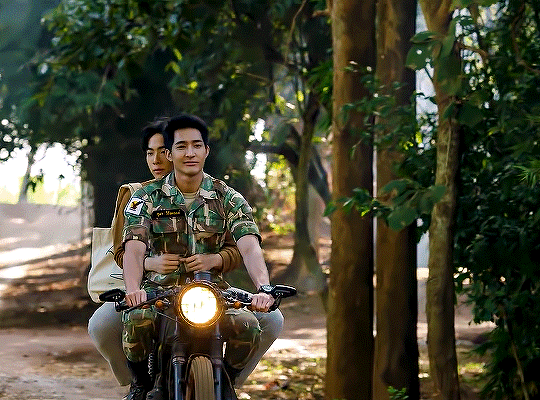

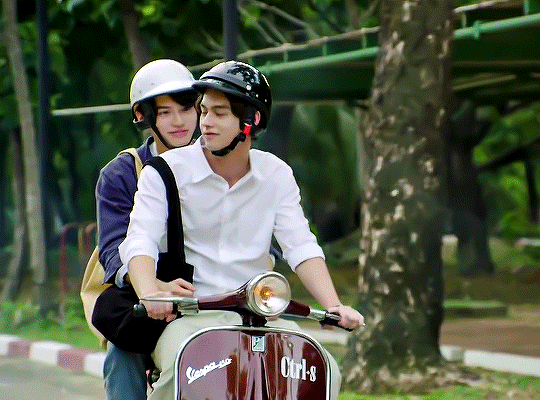
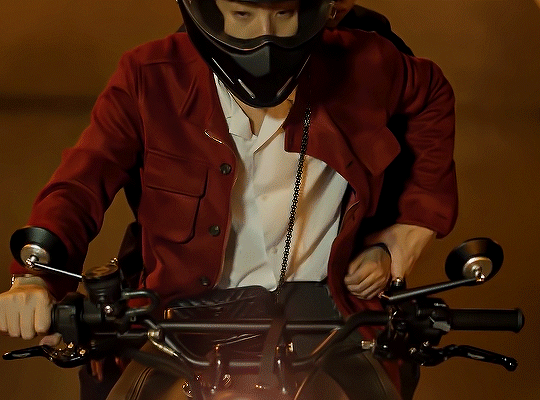
(+) Riding my bike with beloved
Chains of Heart (2023)
Moonlight Chicken (2023)
I Will Knock You (2022)
Vice Versa (2022)
Not Me (2021)
A Tale of Thousand Stars (2021)
I Told Sunset About You (2020)
Still 2gether (2020)
Theory of Love (2019)
#thaidramaedit#asianlgbtqdrama#lgbtqia#chains of heart#moonlight chicken#i will knock you#vice verse the series#not me the series#a tale of thousand stars#i told sunset about you#still 2gether#theory of love#atots#offgun#earthmix#geminifourth#love language set#prangon gifs#tried to find a few kbl and jbl to put in this trope but couldn't find any#there was one in to my star but couldn't say their faces
419 notes
·
View notes
Text
Pain, Trust, and Separation in Some Asian Dramas (The Second Post In a Series of Utterly Un-scholastic, Highly Personal Big Meta)......
AKA, Turtles Catches Up With Old GMMTV: The Bad Buddy Rewatch Edition, Part 2 -- How Themes of Pain, Trust, and Separation Create Structure and Narrative in Bad Buddy and Other Asian BLs
[The following is a preamble I use for my Old GMMTV Challenge posts, here we go! What’s going on here? After joining Tumblr and discovering Thai BLs through KinnPorsche in 2022, I began watching GMMTV’s new offerings -- and realized that I had a lot of history to catch up on, to appreciate the more recent works that I was delving into. From tropes to BL frameworks, what we’re watching now hails from somewhere, and I’m learning about Thai BL's history through what I’m calling the Old GMMTV Challenge (OGMMTVC). Starting with recommendations from @absolutebl on their post regarding how GMMTV is correcting for its mistakes with its shows today, I’ve made an expansive list to get me through a condensed history of essential/classic/significant Thai BLs produced by GMMTV and many other BL studios. My watchlist, pasted below, lists what I’ve watched and what’s upcoming, along with the reviews I’ve written so far.Today, I offer the second of four posts on Bad Buddy, and the second in a Big Meta series on pain in some Asian dramas, including QLs and/or het romances. I'll look today at how ideas of pain in love, trust in love, and separation of partners/family members creates narrative drive in Bad Buddy and other Asian BLs. THIS IS A LONG POST, caveat emptor.]
Links to the BBS OGMMTVC Meta Series are here: part 1, part 2, part 3a, part 3b, and part 4
Well, after a lot of titles and a chewy preamble (thank you for getting through that, y'all!), I'm here to say that I'm combining my two ongoing meta series into one big ol' post here that I've been dying to write for months. In the course of my watching the shows on the Thailand-based Old GMMTV Challenge watchlist, as well as watching shows from my BL gateway of Japan, I've noticed that the themes of pain and trust in love, along with voluntary or involuntary separation, have been used to create dramatic and narrative structure within Asian dramatic stories to many emotional effects.
I'm celebrating the incredible Thai BL drama that is Bad Buddy in my OGMMTVC series at the moment, and within my Big Meta series on pain in Asian dramas, I examine how themes of pain so very often harken back to artistic, and even traditional, viewpoints of how pain, suffering, and melancholy are natural cultural assumptions within many collectivist Asian societies. In my first Big Meta on pain and suffering in Asian dramas, I wrote that "accepting pain and suffering is a part of the life we decide to live, from an Asian cultural perspective." Suffering is a naturally assumed part of life, a very distinct and identified part of a Buddhist's lived life, and even outside of Buddhism, accepting and living with difficulties of all kinds -- wealth disparities, the struggle for a good education and/or a successful career, the struggle to conform to collectivist familial and/or social expectations, etc. -- are extremely common themes that are unwound on in Asian lives on a minute-to-minute basis. The idea that an Asian must live with pain is often a root of intergenerational trauma, passed along from generation to generation of Asian children-to-adults. The social mores by which Asians are raised and live, to assume what Westerners might call a lack of unconditional parental love and affection, are certainly in part rooted in an assumption that living with pain and without the, say, luxury of turning over one's emotions at any given moment, are an automatic given.
As I've plodded through the OGMMTVC watchlist, I noticed very often that separation of people -- whether those people are lovers, children/parents, or simply just adults within a group -- is often a major narrative turning point in the course of a dramatized relationship. Of course it would be; it's a common trope within the romance genre, for instance.
But I find the separation of people otherwise connected to each other -- and the assumed pain of that separation, and the trust that people may have to return to each other -- particularly fascinating within the realm of Asian dramas, for reasons relating to the assumption of pain and suffering in one's life within Asian cultures that I mentioned above. In other words, the pain of separation, and the trust that one might have that one person will come back to another person -- are givens within the scope of Asian life.
In the following dramas, I note that separation is either a central storytelling point, or is a central focus of side characters:
1) The Thai filmmaker, Aof Noppharnach, has explored separation of people/lovers in many of his shows, including Still 2gether, A Tale of Thousand Stars (in multiple forms), and in Bad Buddy (also in multiple forms, romantic and/or familial).
2) Also from Thailand, Until We Meet Again and I Promised You The Moon are two non-GMMTV dramas in which separation of lovers plays an important concluding narrative role.
3) From Japan, the movie version of Cherry Magic: 30 Years of Virginity Can Make You a Wizard?! captures an important central narrative of separation that leads the franchise's two protagonists, Adachi and Kurosawa, to explore depth in honesty and intimacy that they may not have otherwise achieved in their everyday lives.
The painful separation that occurs in Aof Noppharnach's shows is most often related to the outside forces of life as it needs to be lived -- very often economically -- within or external to Thailand. In Bad Buddy, Pran leaves for Singapore for two years. I'm going to unwind much more on Pran leaving for Singapore in the final installment of my Bad Buddy OGMMTVC meta series, particularly by way of how he can do it, emotionally. But I want to offer a quick note about Pran's departure that the show gives a hint to (despite the pain that we feel in our hearts for Pat's loneliness from Pran, as depicted so beautifully by Ohm Pawat and his silent and longing existence as Pat in the first half of the Bad Buddy series finale). The BBS finale has Pran stating that he'll only be away for two years, and that the pay and the opportunity for an excellent architecture job were better in Singapore. In conversation with the fabulous Thai blogger, @recentadultburnout, RAB mentioned that this is a common occurrence among young Thais -- to move overseas for better job opportunities.
In spite of my heart breaking a bit for Pran being away from Pat when I first learned about his leaving for Singapore -- when RAB put Pran's departure in that context, I had to slap my cheek a bit. Because! I'm a child of Asian immigrants. Separation from family for better economic opportunities is a HUGE part of our paradigm of life between continents. As my Asia-based uncle, my mother's brother, once put it, in regards to my mother: "one of the children in our families always had to move away." For my mother's family, it was my mom who shipped off. Besides individuals seeking better economic opportunities for themselves, the economies of many Asian countries are dependent on the reception of remittances from overseas family members sending money back to their home countries, as my mom did for years; the Philippines is particularly notable for having a nearly 9% contribution from overseas remittances to its gross domestic product. In other words? The separation of loved ones is literally built into the financial frameworks of many Asian nations.
The separation of children or partners to overseas locales for the sake of better salaries and/or opportunities is simply a more assumed part of the cultural paradigm, I'd argue, in Asia than in the West. Family separations for jobs are extremely common in Asia; in the West, I'm not sure they are as assumed, especially for extensive separations, as the value placed on keeping a family unit together for cultural or spiritual reasons seems to be more a part of the Western fabric of life (despite our high rate of divorce).
We see an even more permanent economic separation happen in Still 2gether between two side characters -- Type, played by Toptap Jirakit, who is Tine's (Win Metawin) brother, and Man (Mike Chinnarat), who is Sarawat's (Bright Vachiwarit) friend. Man chased after Type during the first 2gether season; in Still 2gether, they're navigating their committed relationship, as Type contemplates, then accepts, a permanent job offer in Phuket, hours away from their home base in Bangkok.
As @lurkingshan put it, I might be the only person on the planet contemplating Type's and Man's relationship (lmao, it do be true), but I found Type's last conversation with Man, on the beach, to be particularly direct and moving for someone who has no immediate plans to move back to the side of the person he's dating.
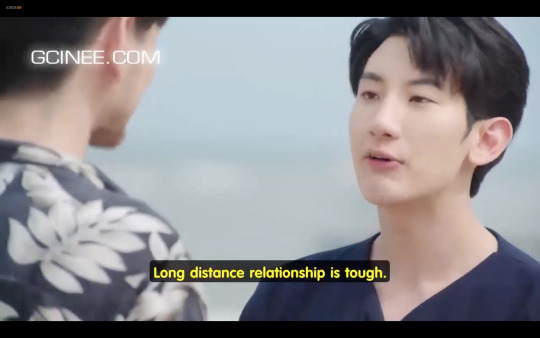
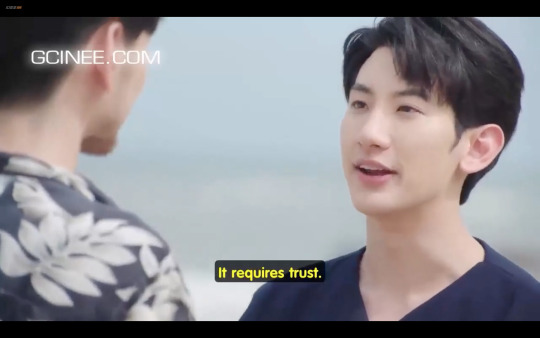
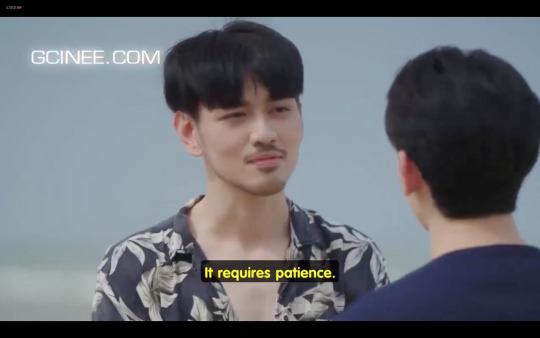
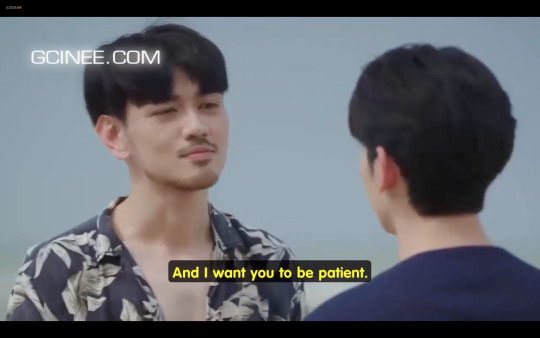

I think about this scene against the structure of the short series that is Still 2gether, which is centered around the protagonists of Sarawat and Tine being temporarily separated as they prepare to compete in a university-wide tournament. Sarawat has the most lovely contemplation on love during this separation, and even Aof Noppharnach himself admits that the glance that Sarawat and Tine give to each other as they pass each other in the lead-up to the ultimate tournament is his favorite scene he's ever filmed (!!!) (and that scene is sooooo reminiscent of Pran's and Pat's pinky-hold after their public "break-up").
In other words: Still 2gether is ALL about separation, and contemplating the strength of love relationships in the face of those separations. While Sarawat and Tine will get back together, after that tournament -- Type and Man are separated for the foreseeable future. There is no end indicated to the patience that Type wants from Man. The conversation is just, THERE, and hanging -- there's an acknowledgment that long-distance relationships are tough, but Type isn't offering to quit his job and move back to Bangkok. Instead, Type and Man are left to accept the reality that there is no end in sight to their separation.
And I think this was incredibly bold of Aof Noppharnach to include in a GMMTV BL that otherwise ended happily for Tine and Sarawat, the main protagonists. What I admire about Aof's works are these sly inclusions of open-ended, sometimes melancholy non-resolutions, either for his main or his support characters, that leave us as viewers often slightly unsatisfied or unfulfilled. He did this in particular with the character of Aof in Gay OK Bangkok, a web series that he screenwrote in 2016; and many might say that Pran being away in Singapore is also not the most satisfying of endings for our beloved PatPran in Bad Buddy. To me, these decisions to do this artistically are just incredibly reminiscent, again, of the kind of pain that we as Asians have been culturally attuned to accept, for the sake of economics, and/or for the sake of the betterment of our loved ones.
Besides economic separations in Aof Noppharnach's works, we also have separations related to family demands and desires. In A Tale of Thousand Stars and Our Skyy 2 x A Tale of Thousand Stars, we see Tian leaving Phupha's side for two years to study for a graduate degree at Tian's mom's insistence; and we see Phupha refusing to join Tian, after Tian has graduated and moved back to Pha Pun Dao, on trips Tian takes back to Bangkok to celebrate his birthday with his parents.
When I rewatched ATOTS earlier this year, I noted that both Phupha and Tian were remarkably bad communicators throughout the original series -- and I posited that, in large part, their terrible communication was borne out by way of the both of them being raised in traditionally masculine Asian households that seemed to not allow for leeway regarding emotional revelations. BOTH Phupha and Tian were expected and intended to follow in the footsteps and demands of their family members. To the end of the ATOTS storyline in Our Skyy 2, Phupha brings up his parents -- and he hears what he has been wanting to confirm from Tian's parents, in their desire to have Phupha take care of Tian for the rest of their lives.
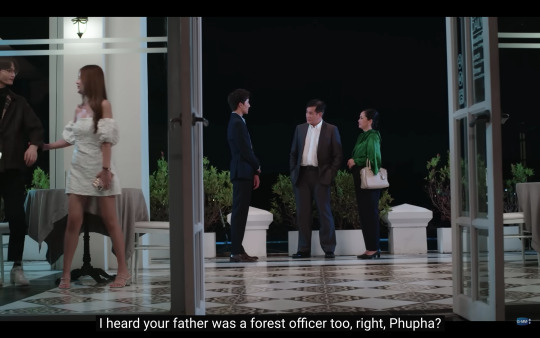

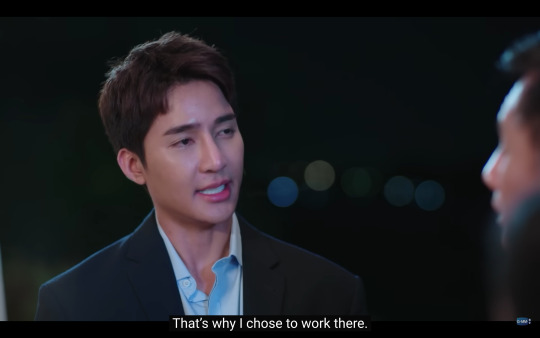
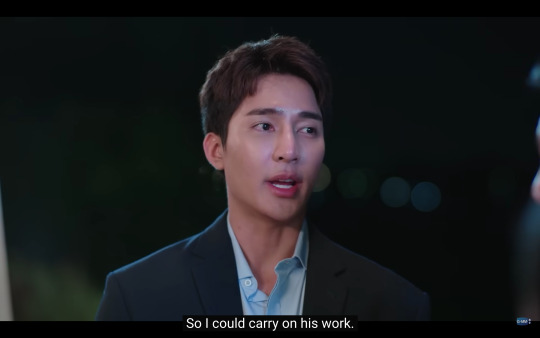
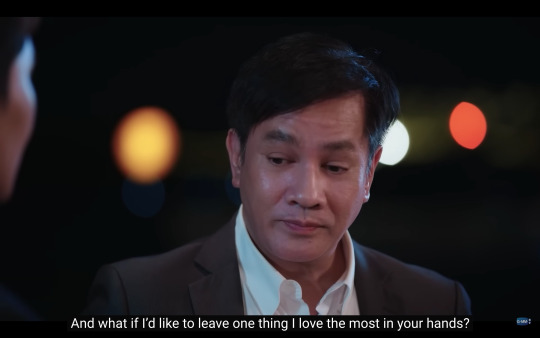
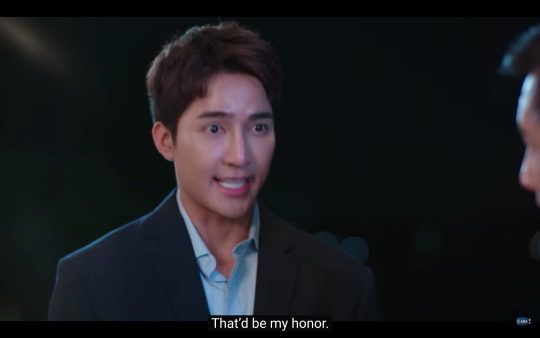
Phupha in particular needed to have multiple gateways opened to him, vis à vis Tian's family, in order to properly and openly confirm his permanent love and commitment to Tian. If Phupha didn't have that? He was willing to be separated from Tian, either temporarily, or at length. Phupha needed a kind of culturally accepting door opened to him -- as a man raised in what we assume to be a rural and traditional environment that may very well have not allowed for a gay man to live openly and honestly. Phupha indeed follows in his father's footsteps, to the extent of never leaving Pha Pun Dao, and demanded that he have Tian's family's approval before making the final commitment to Tian to love Tian forever.
I find the cultural nuances of nuclear family separation, or separation encouraged by nuclear family, to be particularly heartbreaking in many of Aof Noppharnach's works. We know that Jim and Jam, brother and sister in Moonlight Chicken, ran away from their Isan hometown as youths to find their lives in Pattaya, where we meet them in the context of that show. But separation either from nuclear family, or more impactfully, done by nuclear family, is most evident in Bad Buddy.
Besides Pran voluntarily leaving for Singapore, we know that Pran has been involuntarily separated from Pat before -- when Pran was transferred to a boarding school in 10th grade by his mother, Dissaya. Before that transfer, Pran and Pat were technically "separated" by their parents in so far as they were not supposed to become friends -- all while competing heavily against each other in every category of life.
That boarding school transfer? That wasn't just separating Pran from Pat. What I found remarkable about that separation during my recent BBS rewatches is that Dissaya HERSELF chose to be physically separated from her own son, for the sake of her rivalry with Pat's father, Ming.
I'm thinking about this particularly from the words she used with Pran as they sat at breakfast together before Pran started his second year at university, when Dissaya said that Pran could date anyone, men or women, as long as he "didn't date [the next door kid]."
My interpretation of that perspective is that Dissaya did not want Pran to relieve the heartbreak that she herself experienced when she was close with Ming in her teenage years.
In other words: she chose to send her son away in the face of her ongoing, lifelong fear that Ming and his family would once again wreak havoc on her and her clan.
In the continuation of the intergenerational trauma wrought upon Pat and Pran by their parents -- as a mother myself, this seems to be particularly egregious. Dissaya would have rather had her son AWAY FROM HER, than to contemplate her son even being WITHIN physical proximity to Pat in the context of her hatred of Pat's father, Ming, and the fear that she had that the Jindapats would negatively influence the Siridechawats again.
(The wonderful @telomeke reminded me, in conversation on this topic, that the first question Dissaya asks Pran, after learning about the first faculty fight in episode 1 when Pran re-encounters Pat for the very first time, was, "Did he hurt you, Pran?" Dissaya cannot bear to allow the Jindapats to hurt her son, or her family, ever again.)
I wrote in my first Big Meta on pain and suffering that Asian parenting expectations and mores are far more conditional than they are in the West, as parenting mores in the West are centered around unquestioned and unconditional love from parents to children. So much of Bad Buddy meta out there focuses on the internal experiences of Pran and Pat. When I sat back to think about Dissaya making the decision for herself to be separated from her son for years -- and then to also contemplate pulling Pran FROM COLLEGE when she learns that Pat goes to Pran's university -- I mean. We know Dissaya and Ming both tried their best to embody their hatred of each other into their children. But Dissaya takes it a couple steps further, by attempting to literally control Pran's physical existence vis à vis Pat, which -- and I'm going to sound like a judgmental Westerner here, even as an Asian -- strikes me as out of line by way of just pure emotional projection onto one's children.
When Pran goes to Singapore, at the end of the series, it's out of his own volition. Again, I'll write more about this at the end of my BBS OGMMTVC meta series. But what he experienced by ways of many TYPES of separation from Pat throughout his life -- competitively, emotionally, and then physically -- are extensive. He was physically separated from Pat by Dissaya. He was theoretically "separated" from Pat emotionally, by being discouraged in having a friendship with Pat. He is physically separated from Pat *again* when he goes to Singapore. And I posit later in this piece that Pat and Pran had another theoretical "separation" when they are pretending to be broken up throughout the course of their relationship.
When I think about what teenage Pran must have felt to be *physically sent away* -- BY and FROM his own family, for their sake of his family's desires to avoid ANOTHER family -- it explains a hell of a lot more about Pran's tendency to dissociate, particularly during stressful times. (We see this when he's alone at the demolished bus stop, and cutely in Our Skyy 2, as Pat encourages a grumpy Pran to go to Pha Pun Dao.)
And where Pat balanced Pran out -- where Pat could offer the kind of companionship, and relaxed and equitable communication that Pran had never had with his family -- was where Pran could finally experience truly open and SAFE love from and with another person, another person who wouldn't *send him away* if Pran didn't play by their rules. Instead, Pat fought by Pran's side, and Pran was willing to fight, too, and they remained together, and safe in their love and trust.
Whew. Dissaya separating Pran from his own family, from herself -- to leave him alone at boarding school -- seriously punches me in the gut, especially as a mother myself. I'm thinking about a teenager, on the cusp of adulthood, alone to contemplate his unending love for Pat, and I'm like.... I wouldn't leave a kid alone like that for a moment. But for Dissaya, her husband, and their pride? It seemed to be a worthwhile decision in that moment. A decision that we know would blow up in their faces in episode 10 of Bad Buddy.
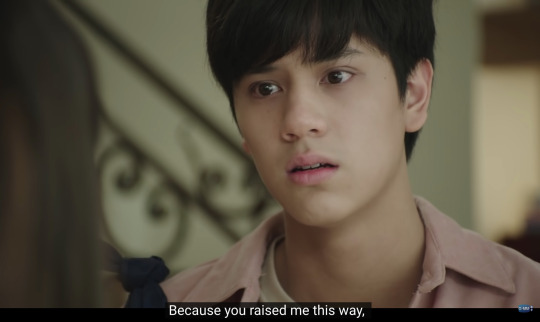
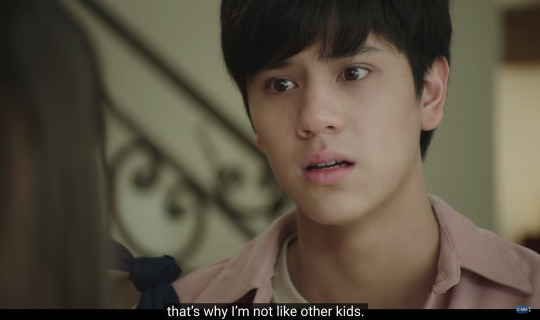
In Pran's first separation from Pat -- Pran did not have personal agency. He did have agency later on, as he moved to Singapore, which again, I'll contemplate in a further meta.
Two instances where I was impressed by protagonists leveraging their agency vis à vis temporary separations from their partners was in Until We Meet Again and in I Promised You The Moon.
UWMA's Pharm was first and foremost presented as a blushing maiden. HOWEVER: Pharm demonstrated quite a bit of sexual agency early in the series. He was forward in his crush on Dean. He contemplated openly being gay. And he wasn't afraid to push Dean away when Dean was moving too fast sexually.
At the end of the series, after Dean and Pharm have resolved their spiritual connection vis à vis the embodied spirits of Korn and Intouch meeting once more -- Pharm wants to know if the love between him and Dean is real, and independent of the influence of the spirits of Korn and Intouch. So: Pharm asks for a break.
Throughout UWMA, Dean is the obvious seme, and Pharm is the blushing uke. I squealed in DELIGHT when I first watched Pharm asking for the break. Yes, Pharm loved Dean -- and what I saw in Pharm's asking for a temporary separation was truly out of that love, to confirm between the both of them that their relationship was very much indeed a forever relationship. God, I get chills thinking about it: Pharm was safe enough in his sphere with Dean to ask for and to GET the agency-driven space that HE NEEDED to feel fully confident in the relationship. That was a risky move that paid off for the two guys in dividends in the end. Dean had no choice but to say yes there.
The fabulous Oh-aew in I Promised You The Moon goes even further than Pharm. He fucking breaks up with Teh! After Teh cheated on Oh-aew! YES, HOMEY, YES! No wibbling on Oh-aew's end. Oh-aew was devastated, yes. But he knew he had to have Teh out of his life in that moment, for the sake of Oh-aew's own happiness, growth, and development. He even rejects Teh's reach-out at the end of their college careers.
What stuck me as so golden about the ending of IPYTM was that that break-up wasn't actually presented as temporary. They were apart for OVER A YEAR (thank you kindly to @shortpplfedup for the temporal fact-check!). Oh-aew held his ground. He needed his time and space. He needed to grow! And he valued that, individually.
I'm celebrating these two instances of agency-driven separations because of the style of their intention vis à vis the protagonists asking for, needing, and leveraging these separations. With the economic and involuntary separations I talked about earlier -- it's like there was a higher need, whether it was for money, a better career opportunity, fear, or selfishness on the part of a family to create the separation.
With Pharm and Oh-aew: the separations they demanded were purely personal and for their own growth. We know now that Pharm and Oh-aew get their endings with their partners. Pharm has a purely happy ending with Dean in Between Us. Oh-aew's ending with Teh is open-ended -- we don't know what chaos Teh will wreak next -- but at least we know they're navigating that chaos together again.
The last drama I wanted to take a look at regarding pain, trust, and separation is the fabulous movie continuation of Cherry Magic: 30 Years of Virginity Will Make You a Wizard?! (I always love writing ?! whenever I talk about Cherry Magic, lol).
The central separation in the movie of the two protagonists, Adachi and Kurosawa, comes about when Adachi is transferred to Nagasaki for work. As @neuroticbookworm and @lurkingshan can attest to: a Western viewer of Japanese BLs will often find themselves screaming to a screen, "JUST TALK ALREADY!," and a uniquely common aspect of Japanese doramas is that so much of communication in Japanese culture is silent, unsaid, kept internal by collectivist social pressures to not make waves with another person -- which automatically creates ongoing questions of trust between partners. When Adachi (Akaso Eiji) shares with Kurosawa (Machida Keita) that Adachi will be moving, Kurosawa shares in words that he's happy for Adachi, but through very simple body language, communicates that he is feeling otherwise.
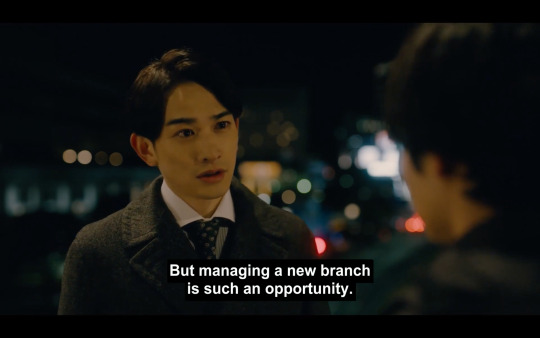
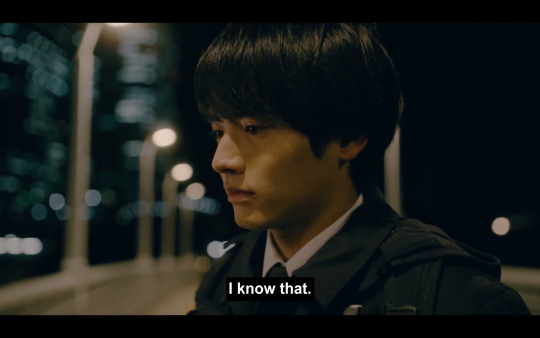
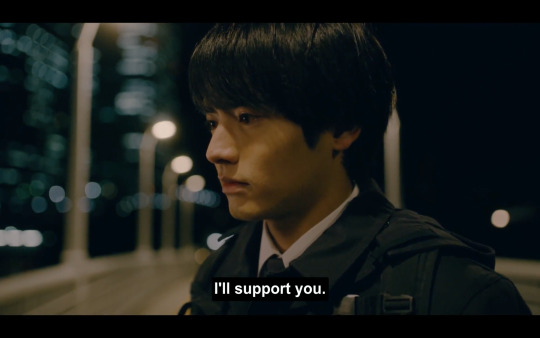
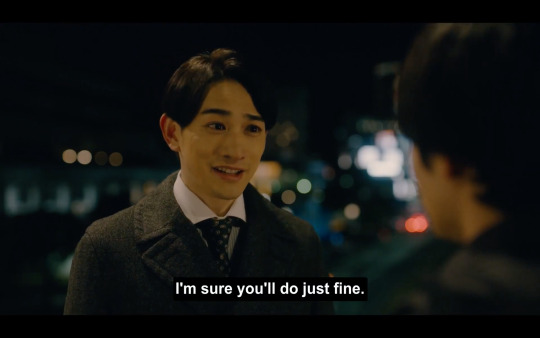
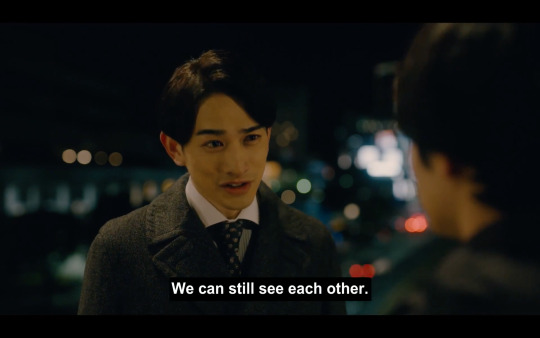
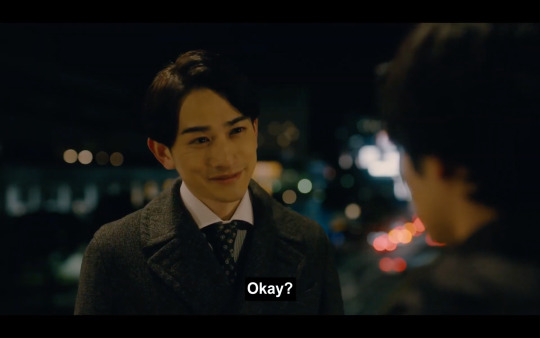
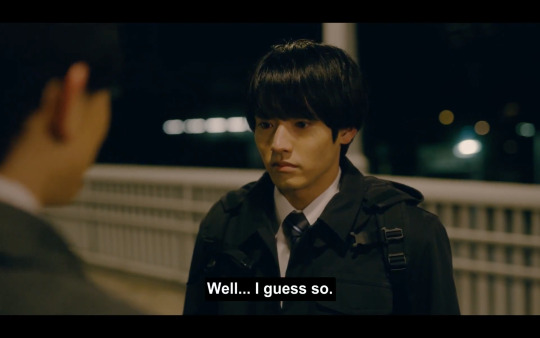
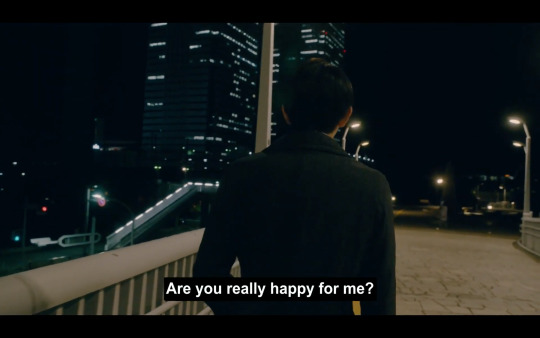
Later in the movie, Adachi gets into an accident in Nagasaki, and Kurosawa rushes to be by Adachi's side. Kurosawa is clearly traumatized. And Kurosawa finally reveals his feelings about the entire situation -- a rare display of direct emotional confession.


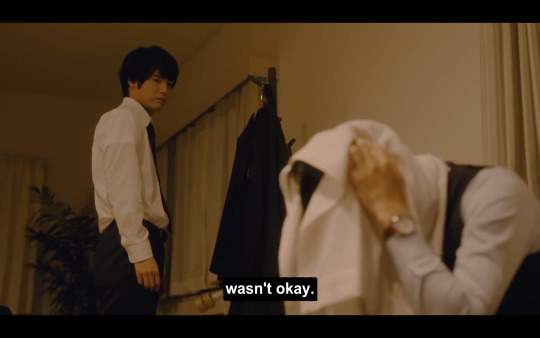
We think that Adachi moved to Nagasaki for this job opportunity -- separating himself from the incredibly devoted and head-over-heels-in-love-with-Adachi Kurosawa. Adachi knows well enough that Kurosawa is suffering in this separation. But later in the movie, after Adachi has moved back with Kurosawa, do we learn Adachi's true intentions. Adachi wants to make himself invaluable at work -- so that Adachi's and Kurosawa's shared company will not separate them if the company finds out about their relationship.
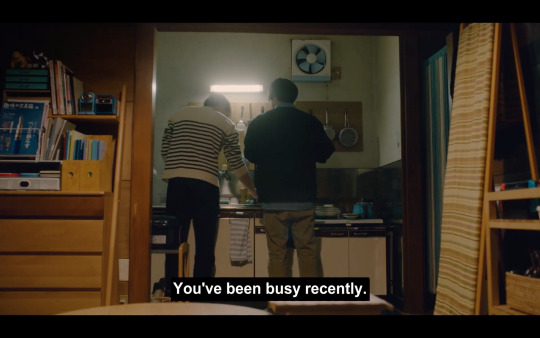

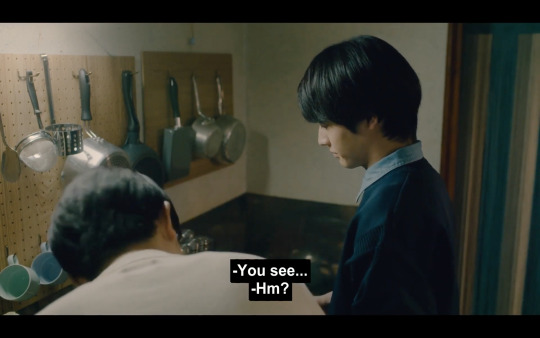
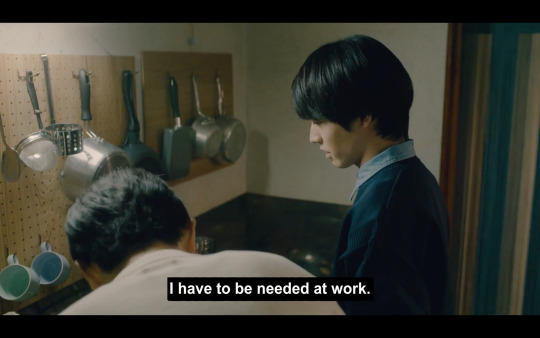

This particular conversation between Adachi and Kurosawa -- after their separation, after they've moved in together -- is a huge turning point in the movie for Adachi, who had usually been the reluctant uke in their relationship prior to this moment. In this conversation, Adachi expresses his fear that outside forces will eventually separate them, and he wants to do what he can to ensure the safety of their relationship.
To me, this is incredibly reminiscent of the compromises Pran and Pat make in Bad Buddy to keep their relationship secret -- another theoretical "separation" -- from their parents for the health, safety, and viability of their relationship.
As well, this conversation between Adachi and Kurosawa moves forward into Adachi's desire to come out to their families. He was inspired by the immediate aftermath of the accident, in which Kurosawa was the last person to find out that Adachi had gotten hurt -- only after Adachi's family and company were notified.
The nuances of this separation between Adachi and Kurosawa -- and what the separation LED TO, which was an eventual and permanent commitment between Adachi and Kurosawa -- are incredibly layered. Adachi made an economic separation from Kurosawa. But it was also rooted in his desire to acclimate his company to his company's dependence on Adachi, so that the company would choose Adachi's contribution to the company over the potentially taboo reality of his same-sex relationship with a colleague in Kurosawa. In other words: he wanted to leverage the separation and his work performance upon his return, to render the company no choice in choosing Adachi's economic performance over his personal and private choices.
(One insight into Japanese culture is that for decades, Japanese corporations have wanted their employees to be married, to complete a seamless connection between household and "office" families. The Japanese BL Kinou Nani Tabeta?/What Did You Eat Yesterday? makes reference to the fact that the main protagonist, Shiro, becomes an independent lawyer because, as a gay man, he may have been pressured to take a wife in another, more group-oriented corporate setting.)
AND, following this, Adachi wanted to come out to his and Kurosawa's families, to also acclimate them to their relationship, so that their families would also not threaten the sanctity and safety of their relationship. And his gamble worked -- and their families accepted them, and they were able to make a permanent commitment to each other.
Without a strategically economic separation, Adachi and Kurosawa could not have achieved key moments of communication that led to their ability to find safety in their external environments, and make a personal and private permanent commitment to each other. The separation to Nagasaki was Adachi's lever to move their relationship forward.
It's so nuanced, so layered, and so strategic on Adachi's end, to use the work separation and his commitment to his company as such a motivator to propel his relationship forward and permanently with Kurosawa -- especially vis à vis the unique nuances of spoken and unspoken communication in Japanese society, which are remarkably different than the styles of communication we see in Thai dramas.
In Pran's and Pat's conclusion in the Thailand of Bad Buddy, they go in the opposite direction: for the sanctity and safety of their relationship, they act out a break-up scenario (with Dissaya telling Pran, "come back to your family," ha), and keep their committed relationship a secret. And this happens *two years* before the context of an actual, physical separation when Pran decides to move to Singapore after graduation.
It's a bit of a switcheroo from what we'd expect by way of open vs. closed communication between Japan and Thailand. But both scenarios, from Cherry Magic to Bad Buddy, work brilliantly well to ensure that all relationships are safe and solidified.
I'm not sure that I can say, globally, that separation from one's nuclear family, or separation from a partner, are common occurrences in manifested everyday reality. As I mentioned before, the economies of many countries are dependent on the physical separation of their citizens to other locales to send back monetary remittances. But more often than not -- when partners are partnered, they tend to want to stay by each other's sides.
I love that many Asian dramas do not shy away from the many realities as to why partners or children may be voluntarily or involuntarily separated from loved ones. Our beloved dramas show us the devastation of involuntary separations, as rendered by Dissaya unto Pran. We see that economic separations can actually LEAD to a solidifying of relationships in the case of Adachi and Kurosawa. We see that family-motivated separations, in the cause of Phupha and Tian, simply needed the investment of time for their relationship to reach a point of comfortable commitment. We see that agency-driven separations by Pharm and Oh-aew can lead to emotional clarity. And, we see that theoretical, secret-kept "separations," of the kind that Pat and Pran created for themselves, to protect their relationship, were risks worth taking, simply for them to be together and happy.
Pain and happiness are not emotions independent of each other. At least in the eyes of my Asian cultures, human beings embody all emotions, all the time. Humans are certainly primed, internally and socially, to seek happiness and balance. But as I've posited here in this post -- is there pleasure without pain? The pain of separation, the trust that partners and family members can learn from each other through separation, and the lessons and communicative ability to solidify relationships after the obstacles of separation, are all themes of life that, I think, are worth unwinding on, in glorious emotional detail. And I love that our beloved Asian dramas do not shy away from these examinations.
(Tagging @dribs-and-drabbles and @solitaryandwandering by request! If you'd like to be tagged, please let me know!)
[Well, this one was a doozy -- if you got through it all, I thank you! Next up, next week, is another post I've been dying to write for months. I had the opportunity to engage in lengthy conversation with a number of FABULOUS Asian Tumblr bloggers, all of us Bad Buddy stans, to reflect on our experiences as Asian reviewers watching BBS and to talk about what we related to. I have a list, a WHOLE LIST! of themes to expound on. I'm calling it Asian Cultural Touchpoints Within Bad Buddy. And I may need to split it into two posts, because there's a lot to talk about. Join me and my friends next week in our continued Bad Buddy brain-rot sesh!
Here is the status of the Old GMMTV Challenge watchlist. Tumblr's web editor loves to jack with this list; please head on over to this link for the very latest updates!
1) The Love of Siam (2007) (movie) (review here)
2) My Bromance (2014) (movie) (review here)
3) Love Sick and Love Sick 2 (2014 and 2015) (review here)
4) Gay OK Bangkok Season 1 (2016) (a non-BL queer series directed by Jojo Tichakorn and written by Aof Noppharnach) (review here)
5) Make It Right (2016) (review here)
6) SOTUS (2016-2017) (review here)
7) Gay OK Bangkok Season 2 (2017) (a non-BL queer series directed by Jojo Tichakorn and written by Aof Noppharnach) (review here)
8) Make It Right 2 (2017) (review here)
9) Together With Me (2017) (review here)
10) SOTUS S/Our Skyy x SOTUS (2017-2018) (review here)
11) Love By Chance (2018) (review here)
12) Kiss Me Again: PeteKao cuts (2018) (no review)
13) He’s Coming To Me (2019) (review here)
14) Dark Blue Kiss (2019) and Our Skyy x Kiss Me Again (2018) (review here)
15) TharnType (2019-2020) (review here)
16) Senior Secret Love: Puppy Honey (OffGun BL cuts) (2016 and 2017) (no review)
17) Theory of Love (2019) (review here)
18) 3 Will Be Free (2019) (a non-BL and an important harbinger of things to come in 2019 and beyond re: Jojo Tichakorn pushing queer content in non-BLs) (review here)
19) Dew the Movie (2019) (review here)
20) Until We Meet Again (2019-2020) (review here) (and notes on my UWMA rewatch here)
21) 2gether (2020) and Still 2gether (2020) (review here)
22) I Told Sunset About You (2020) (review here)
23) YYY (2020, out of chronological order) (review here)
24) Manner of Death (2020-2021) (not a true BL, but a MaxTul queer/gay romance set within a genre-based show that likely influenced Not Me and KinnPorsche) (review here)
25) A Tale of Thousand Stars (2021) (review here)
26) A Tale of Thousand Stars (2021) OGMMTVC Fastest Rewatch Known To Humankind For The Sake Of Rewatching Our Skyy 2 x BBS x ATOTS (re-review here)
27) Lovely Writer (2021) (review here)
28) Last Twilight in Phuket (2021) (the mini-special before IPYTM) (review here)
29) I Promised You the Moon (2021) (review here)
30) Not Me (2021-2022) (review here)
31) Bad Buddy (2021-2022) (thesis here)
32) 55:15 Never Too Late (2021-2022) (not a BL, but a GMMTV drama that features a macro BL storyline about shipper culture and the BL industry) (review here)
33) Bad Buddy (2021-2022) and Our Skyy 2 x BBS x ATOTS (2023) OGMMTVC Rewatch (The BBS OGMMTVC Meta Series is ongoing: preamble here, part 1 here, and more reviews to come)
34) Secret Crush On You (2022) [watching for Cheewin’s trajectory of studying queer joy from Make It Right (high school), to SCOY (college), to Bed Friend (working adults)] (watching)
35) KinnPorsche (2022) (tag here)
36) KinnPorsche (2022) OGMMTVC Fastest Rewatch Known To Humankind For the Sake of Re-Analyzing the KP Cultural Zeitgeist
37) The Eclipse (2022) (tag here)
38) The Eclipse OGMMTVC Rewatch For the Sake of Re-Analyzing an Politics-Focused Show After Not Me
39) GAP (2022-2023) (Thailand’s first GL)
40) My School President (2022-2023) and Our Skyy 2 x My School President (2023)
41) Moonlight Chicken (2023) (tag here)
42) Bed Friend (2023) (tag here)
43) Be My Favorite (2023) (tag here)
44) Wedding Plan (2023)
45) Only Friends (2023) (tag here)]
#bad buddy#bad buddy the series#bad buddy meta#bad buddy the series meta#backaof noppharnach#aof noppharnach#nanon korapat#ohm pawat#ohmnanon#patpran#pran x pat#pat x pran#still 2gether#a tale of thousand stars#atots#our skyy 2 x bad buddy x a tale of thousand stars#cherry magic#cherry magic the movie#until we meet again#i promised you the moon#i told sunset about you#ipytm#itsay#moonlight chicken#the bbs ogmmtvc meta series#turtles catches up with the essential bls#turtles catches up with thai bls#turtles catches up with old gmmtv#the old gmmtv challenge#ogmmtvc
74 notes
·
View notes
Text

the legend himself
#vi.txt#backaof noppharnach#fourth nattawat#mark pakin#bad buddy#moonlight chicken#a tale of thousand stars#dark blue kiss#still 2gether#he's coming to me#just look at the filmography and it's an even longer list if i add the shows he's produced!!!#midnight series#dirty laundry#10 years ticket#never let me go#the warp effect#my school president#the eclipse#baker boys#mama gogo#p.s. i hate you#THE MAN RARELY MISSES AND TURNS EVERYTHING GOLD I LOVE HIM DEARLY#I TRUST HIM WITH MY LIFE#special mention: magic of zero aka zero photography ft. InkPa
255 notes
·
View notes
Text
GMMTV BL Tournament - Round 2

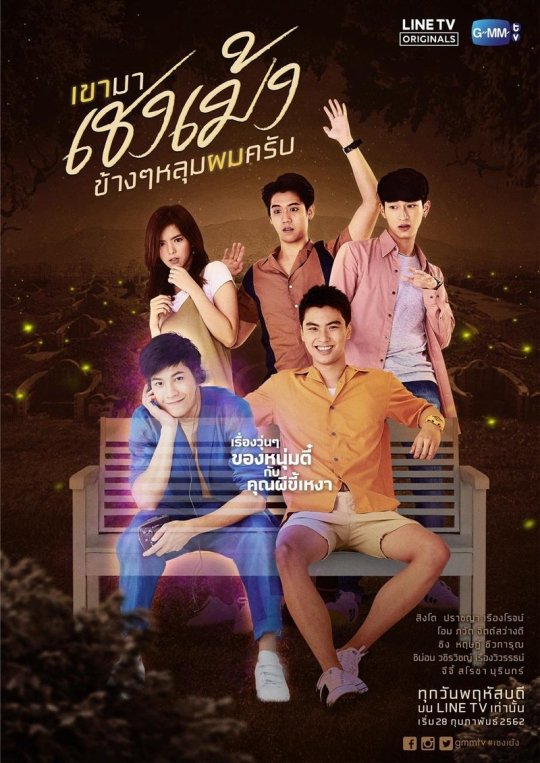
#2gether#2gether the series#still 2gether#he's coming to me#gmmtv#thai bl#thai drama#bl drama#polls#round 2
80 notes
·
View notes
Text
IT ALL MAKES SENSE
👉--------👈

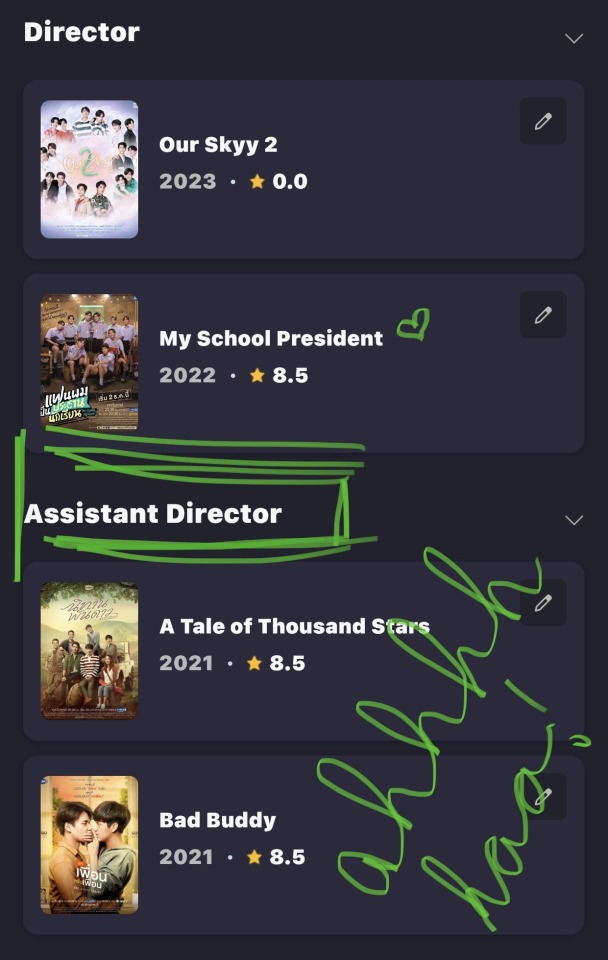

#I didn’t realize we had p’aof’s apprentice in our midst#au kornprom niyomsil#au kornprom#my school president#a tale of thousand stars#bad buddy#oxygen the series#still 2gether#dark blue kiss#theory of love#thai bl series#thai bl drama#thai bl#thai series#gmmtv bl
227 notes
·
View notes
Text
Yk sarawat used to say keep looking at me like that & i will kiss you till you drop but xie lian actually did it but instead he dropped hua Cheng dead lmfao
#tian guan ci fu#mxtx tgcf#danmei#heaven official's blessing#eternal faith#hualian#hua cheng x xie lian#hua cheng#xie lian#still 2gether#2gether the series#thai bl#sarawatine#2gether tine#2gether sarawat
26 notes
·
View notes
Photo
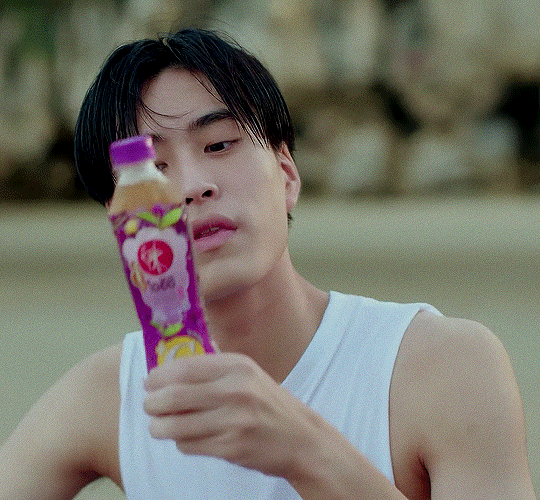

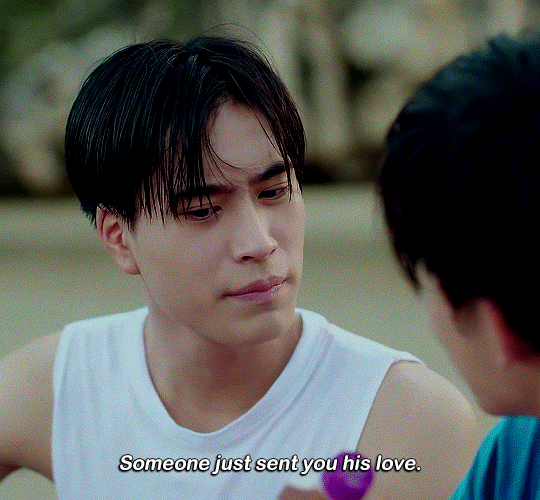
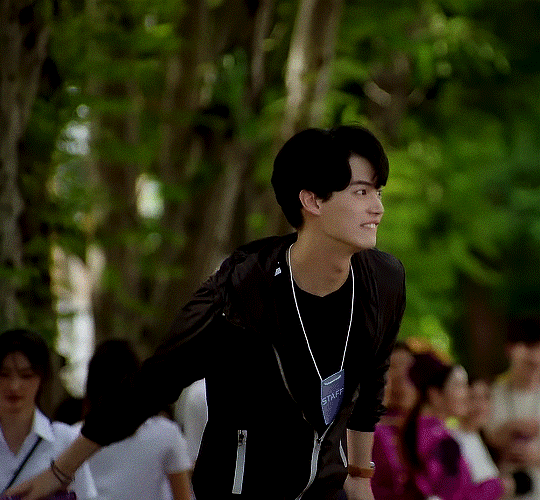
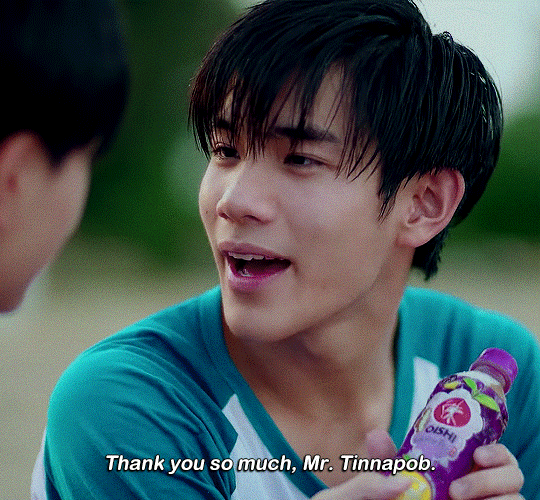
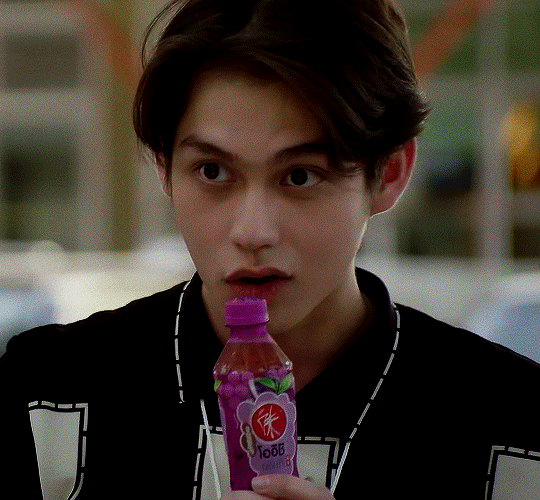

— my school president (2022) // still 2gether (2020)
#asianlgbtqdrama#bldramaedit#my school president#still 2gether#gemini norawit#fourth nattawat#bright vachirawit#win metawin#my school president the series#2gether the series#thai drama#this is where my mind went#i hate gmmtv pp#but this sarawatine scene is everything to me#obligatory gmmtv yt quality hate tag#i also actually hate this colouring#but these have been through so many iterations#and i can't look at them anymore
165 notes
·
View notes
Text
The Thai Communal Wardrobe item #37
Still 2Gether ep 1:

Bad Buddy ep 8:
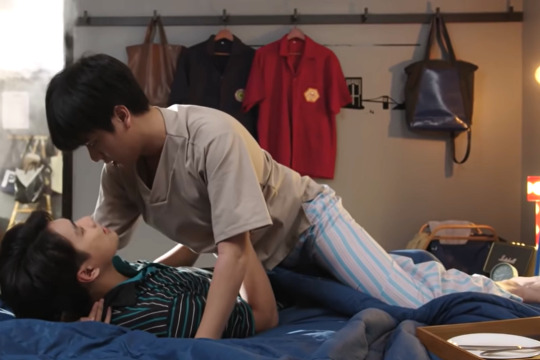
for @telomeke 💙
#still 2gether#bad buddy#bad buddy series#bad buddy the series#the thai communal wardrobe#a bl advent#you suggested something 'funny or stylish or that I think you might like'#well. I hope you appreciate pran's pj pants as much as I do 😁#plus today's posts also have a theme#so check out number 19 which will get published later today!
26 notes
·
View notes
Text
I think you all don't understand how JittiRain's style of writing works on you...
You "hate" on all of the shows based on her novels but tbh most of her characters are very well written (yes, even the ones we dislike). And yes, her main trope is miscommunication but she throws in the SUPERNATURAL sparkle which makes it amazing (at least to me).
Let's get everything in order.
Theory of Love (2019)
Did we hate Khai? Yes.
Did he get what he deserved? Yes. If you know a few things about the novel, man has repaid his sins.
Does it have huge rewatch-abilty points? Yes. I personally think about it all the time.
Also, we got MEMES from this show. Y'all watched it.
2gether, Still 2gether and The Movie (2020, 2021)
One sentence. WE MADE A MEDIOCRE AT BEST SHOW SO HUGE THAT GMMTV IS STILL TRYING TO MILK IT.
We watched it. It was not good. Thankfully P'Aof came in for Still 2gether and made it bearable but apparently you like hot guys and you're showing it.
Memes? Yes. Side couple? Yes. Guitar? Yes.
Do I need to say anything else? Y'all watched it.
Fish Upon the Sky (2021)
A literal disaster. The show compared to the novel was nothing. Thankfully (again) P'Aof produced the show and made it somehow watchable. And yet again we made the main (if not both) couple(s) of the show HUGE, so huge that they have an actual P'Jojo show they STARRED in which, believe me, is a HUGE UPGRADE.
Also, it was kinda cute and we got a lot of memes but that's about it. Y'all watched it.
Vice Versa (2022)
Do I need to remind you what kind of ruckus this motherfather show caused while it aired? We were OBSESSED. Theories, cinematography explanations, camera angles, everything. The whole color per episode thingy (which was also in the novel btw), studying the locations, the whole package and yet you dare to tell me that you did not enjoy this show?
Puen was a piece of poop most of the time but he came around IN THE NAME OF LOVE and I approve.
I still have a Talay pfp ffs. No need for anything else. Y'all watched it.
You enjoyed all her shows, now stop crying about it and saying you don't trust her because the woman has been playing with y'all for years, you like it but you don't want to admit it.
WATCH BE MY FAVORITE FOR GAWIN!
#theory of love#offgun#2gether#still 2gether#brightwin#fish upon the sky#pondphuwin#vice versa#jimmysea#JittiRain#fluke gawin caskey#be my favorite
71 notes
·
View notes
Text
Turtles Catches Up With Old GMMTV: 2gether and Still 2gether Edition
[What’s going on here? After joining Tumblr and discovering Thai BLs through KinnPorsche in 2022, I began watching GMMTV’s new offerings -- and realized that I had a lot of history to catch up on, to appreciate the more recent works that I was delving into. From tropes to BL frameworks, what we’re watching now hails from somewhere, and I’m learning about Thai BL's history through what I’m calling the Old GMMTV Challenge (OGMMTVC). Starting with recommendations from @absolutebl on their post regarding how GMMTV is correcting for its mistakes with its shows today, I’ve made an expansive list to get me through a condensed history of essential/classic/significant Thai BLs produced by GMMTV and many other BL studios. My watchlist, pasted below, lists what I’ve watched and what’s upcoming, along with the reviews I’ve written so far. Today, I tackle the impact of GMMTV’s biggest BL, 2gether, and its companion follow-up, Still 2gether.]
Alright! We have reached a major milestone in the Old GMMTV Challenge. This entire project started off on the backs of two now-seminal posts (for me! and I hope for you, too!). The first one was a dialogue I had with the ever-lovely @miscellar regarding how Bad Buddy had addressed BL tropes and turned those tropes around for a singular drama experience. At the time of my asking @miscellar about this, I hadn’t organized myself to do a chronological exploration of Thai BLs as a genre -- I was picking and choosing what to watch, and I knew that what I had watched in Bad Buddy was formative. I wanted to learn more.
@absolutebl had caught the scent of this discussion, as others were sending them asks of this historical nature as well, and they penned this post that listed out the three dramas that they thought best explained how GMMTV came to its current state of programming -- GMMTV’s apology tour, as we called it back then, with Love Sick, SOTUS, and 2gether listed as the three dramas one needed to watch to understand the state of GMMTV’s BL programming now.
So with that, I dove in, and publicly began building out the OGMMTVC, with major help from @absolutebl, @bengiyo, @shortpplfedup, @lurkingshan, @miscellar, @nieves-de-sugui, @solitaryandwandering, and many, MANY others along the way (@manogirl singlehandedly introduced me to MaxTul, for which I say, FUCK YEAH, FRIEND, THANK YOU!).
And the milestone that we’re celebrating today is that I’ve crossed the 2gether and Still 2gether threshold -- 2gether being the last drama on @absolutebl‘s original list. And, of course! I have thoughts on 2G and S2G.
(Before I dive in, I just want to say that I’m saving some juicy, juicy analysis of the pain/suffering/separation type for a separate meta that I’m hoping to publish later this week, offering a comparative analysis of Still 2gether to Bad Buddy and Until We Meet Again. I don’t want to unwind this here, because I want this post to focus in large part on 2gether’s media influence, but -- stay tuned, I’m headed for more pain meta shortly, tee hee!)
So, yeah, 2gether -- wow, right? Haha.
No, not quite, I’m just sort of joking. I’ve had EXCELLENT dialogue with the fabulous @bengiyo and @so-much-yet-to-learn about there being some shining spots in 2gether, which I agree with them about. (For both 2G and S2G, @bengiyo and @so-much-yet-to-learn shared with me some incredibly moving reflections on what it meant that Bright Vachirawit, in particular, was so emphatic about Sarawat being identified as gay in the show -- and how that spoke to the queer community during 2G’s prime. Thanks to you both for those timely comments.)
I think those of us who watched this 2G installment of the franchise know inherently what its major issues are, including a lack of chemistry emanating from Win Metawin, and an overabundance of pure talent and eagerness from Bright Vachirawit that wasn’t met at his level, à la Krist and Singto in SOTUS.
Besides the 2gether series itself -- which I’ll get back to in a minute -- I just want to note the external landscape of the show’s airing. We now all know that this show premiered in the very early stages of the COVID pandemic emanating out of Asia. 2gether’s popularity has long been attributed to people being at home to watch shows, many of whom likely were watching Thai BLs for the very first time. According to 2gether’s wiki, the show reached 100 million views by April 2020 on LINE TV ALONE (thank you to @lurkingshan for dropping the data!). Both Bright and Win have MASSIVE social media followings now, FAR outnumbering the other stableholders at GMMTV (Tay, Off, Gun, Nanon, etc.). And, 2gether’s continued success in and out of Asia is mostly attributed to the nostalgia that first-time viewers may have about 2gether being their first BL.
I thought this was all interesting to note in a recent Instagram post that Toptap Jirakit, who plays Type in 2gether/Still 2gether, posted. He hit the streets, interviewing Thai fans on their favorite BL series. I think it’s likely convenient for his own career that most of the interviewees listed 2G in their top three lists -- but it made me think.
I know, especially from discussions with @bengiyo and @lurkingshan, that there was a LOT of BL fan dismay about the ending of 2G. To be UTTERLY honest, I TOTALLY MISSED the ending high-five, because I was looking for, like, something BIG at the end, and, lol, the high-five totally went over my head. I guess that’s a good description for my feeling of the entire series, which I’ll dive more into in a bit.
First, I want to offer another, but supporting, theory on 2G’s popularity. Taking into account that Toptap IG video (again, acknowledging the self-promotion within it), as well as Bright and Win’s massive popularity, I want to meditate on the wider fandom of BLs vs. non-BL dramas in Asia. BLs in Japan, for instance, are often relegated to midnight-or-later airing times on television. And much of GMMTV’s content is online-based first. I don’t know, as BL fans, if we’re routinely and globally aware that the fandom for BLs -- which is big, maybe even huge -- is dwarfed by, say, the fandom of a mid-sized K-drama. The BL industries in Thailand and Korea are still relatively young and nascent, while other non-BL drama machines are well-oiled across the continent.
In other words -- yes, because of COVID did 2G find a much bigger audience. But I also want to offer that 2G’s...chastity? chasteness?...may have also HELPED this particular series gain such wider appeal. In other words: Asian audiences of a larger mass, outside of established BL fandoms within and outside of Thailand, may have responded more favorably to 2G BECAUSE of 2G’s lack of sex, a lack of innuendo, a lack of insinuation.
(Remember: in majority cishet society, sex is judged. And queer sex? Forget about it. I’ve established in this OGMMTVC that queer sex is even fodder for creating discriminatory material WITHIN the BL genre itself. Sex AND queer attraction give many people the jibbles. Audiences going to non-BL dramas may be doing so because they want to consume specifically het content. Same-sex romance just might not be their thing. And those non-BL drama genres are GIGANTIC -- from funding to viewership, etc.)
In that Toptap video, many fans list Bad Buddy, A Tale of Thousand Stars, and others as their other favorite BLs. Putting BBS aside for a second -- because there WAS intimacy in BBS, just not an overabundance of it -- we can consider ATOTS as another example of a BL that happens to be quite popular in Thailand, demonstratively, while also being subject to similar criticism by BL fandom as 2G in having a lack of intimacy.
While us in the BL fandom will readily make fun of 2G for not having intimacy at all, I do think, for Asian audiences not accustomed to an abundance of sex and/or same-sex sex in media -- the way that us Western viewers have in our majority media -- that 2G was accessible. It wouldn’t have to make your non-BL fan, new to the genre, uncomfortable -- especially to see same-sex intimacy.
(The wonderful @telomeke made a similar point last week in a conversation about queer acceptance vis à vis Thai politics. I wonder if our devoted BL fandoms lull us to think that an ENTIRE COUNTRY might be accepting of the queer community and queer politics and policies. It’s definitely not a reality in any single nation worldwide. There are always going to be complicated dichotomies of acceptance in every single society that humans exist in.)
When I got to the end of 2G, and saw that there wasn’t going to be any kissin’ or huggin’ -- it made TOTAL sense to me WHY this show was popular OUTSIDE of the already-established BL fandom, particularly in Asia. It ain’t my cup of tea, but it was a show that I could see, like, my Asian cousins watching, as an introduction to queer revelations and engagement. And then, if they stuck with the genre, I could see them going to, say, an ATOTS, before going to a BBS, a show that really addressed the development of queer intimacy between men. Numbers-wise -- yes, COVID explains 2G’s popularity. Content-wise? Content-wise, 2G stays in people’s hearts, partly because I believe it didn’t PUSH those hearts, as a same-sex starting gun to their first exposure to BL.
I could get well into an analysis of how sex, generally, is perceived in Asia, and ALL of the cultural nuances and biases AGAINST sex in Asia (cc @neuroticbookworm, as we have talked about potentially writing meta together on this topic from our shared South Asian lens). But I happen to think that some of our beloved BL filmmakers -- P’Aof Noppharnach, Jojo Tichakorn, New Siwaj, Cheewin Thanamin -- have actually addressed it, and beautifully so, and continue to do so. For instance, the ending quote placards in Dark Blue Kiss touch multiple times on Thailand needing more sex education. Just to offer a personal example -- I’ve had to talk to Asian relatives well into their thirties, as an American, about their first exposure to sex, to explain that sex is not... a bad thing. It’s the cultural and social judgments that accompany sex that colors a person’s worldview on sex.
2G didn’t challenge ANY OF THAT. In fact, in casting Win, they chose a dude who was VERY CLEARLY not INTO that -- to me, à la the casting of Krist Perawat in SOTUS.
No sex? No moral challenges, no ethical quandaries, no uncomfortable moments with a same-sex acting partner. Just two dudes dating, cute cute, holding hands at the Scrubb concert (or whatever).
Of course, for my tastes, as y’all know, I desire something more complicated. And I understand that GMMTV HEARD the feedback that many established BL fans had about that 2G ending. And P’Aof Noppharnach, at the time of 2G’s ending, clearly said something to the effect of, not on my watch, I’m actually going to take this franchise AND FIX IT, MY WAY, which, fuck, COULD I LOVE THIS MAN MORE? No -- but YES, I found a way to love him more.
And we got Still 2gether -- a show rooted in its QUEERNESS. QUEERNESS AND INTIMACY AND INDICATIONS OF SEX. I mean, look!
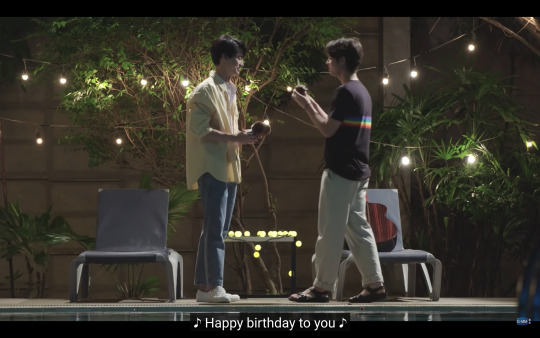
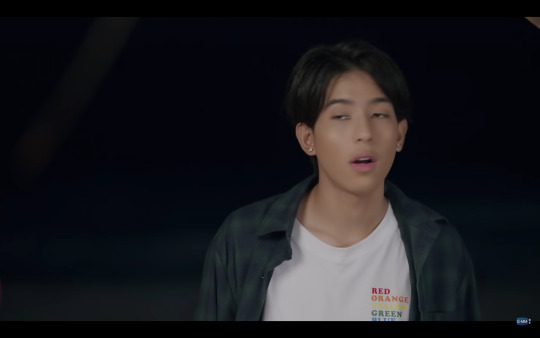
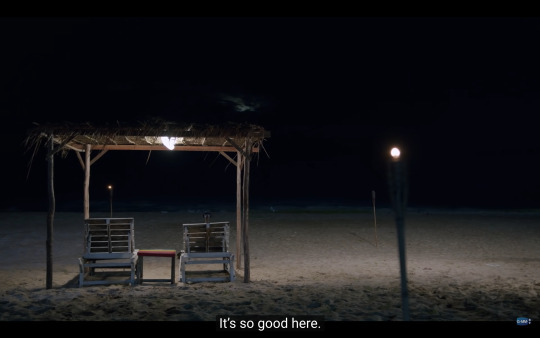
Not just rainbow shirts! Rainbow shirts on multiple people. And rainbow TABLES. P’Aof was like, WE ARE NOT MISSING A MOMENT HERE, PEOPLE. We’re going to fix this. We’re going to claim BL for the queer community who actually serve at the mercy of the audience that consumes BLs.
Before I dig further into S2G, for which I have reams of notes, as opposed to 2G (obviously) -- some quick positive notes on 2G. Wat’s romantic confession in the shelter bus in the forest was seriously heart-warming. It was romantic as fuck. And we see a NUMBER of tropes that make their way into BBS -- bringing over a beverage to someone who is joined by another potential romantic partner; how everything needs to be a competition or a “deal”; all the singing and writing of songs; make-up remover/micellar water (hi @miscellar, ha!); the keeping of a guitar for someone else. I loved seeing those tropes in 2G. I love when shows talk to each other.
Most of all, 2G established Sarawat as committed to his pursuit. Bright was UNABASHED in his role as Sarawat. It was Win/Tine who could not meet Bright’s level -- seemingly out of, what, disinterest? Repulsion? Maybe even a lack of acting talent? It wasn’t obnoxious, per se. It just seemed like Win didn’t know HOW to respond, or even what to respond TO -- all while Bright/Wat CLEARLY SIMMERED in his role. (Like I said earlier, @bengiyo has shared that Bright was emphatic in interviews that Sarawat was gay, while Win was less forward about Tine and who Tine was.)
And I think S2G absolutely grabbed Bright’s talent and spotlighted it. I am deeply glad that the ending of S2G had a such a STRONG sexual insinuation, à la AePete’s SIMMERING attraction in Love By Chance, and even in moments throughout the show as well, and I loved how S2G leveraged Bright’s fabulous acting as Sarawat IN those insinuations. Because -- contrary to how my Asian parents raised me, and how many Asians are TAUGHT to THINK about sex, which is to say, to try to ignore it or laugh at it -- PEOPLE HAVE SEX. And sex, and QUEER SEX, are things to be celebrated. Sex is beautiful, and BELONGS in stories of romance and love. To have had it essentially...deleted?...from 2G removed a huge sense of reality from that piece of drama art.
S2G also focused on a thing that many in the BL fandom actually pooh-pooh: it focused on a committed, ongoing relationship. My favorite BL in the world, Kinou Nani Tabeta?/What Did You Eat Yesterday? is focused on two middle-aged guys in the middle of their years-long relationship. I’m a married mom. I want to see the struggle. I love first love in BLs, don’t get me wrong -- my Cherry Magics, my BBSs, my Old Fashion Cupcakes. But I also don’t mind the struggles. Give me a Minato’s Laundromat, season 2, any day.
I think P’Aof was offering a subversion to Thai BL expectations by showing Tine and Wat in their settled relationship, a year in, where even Sarawat admits -- the sweetness of the relationship has worn off. The guys are working together, living together, working on their relationship together, eating instant noodles together, instead of the green curry and simmered pork and eggs that Tine lovingly made for Sarawat in their early days.
I feel like I’ve said this before, but let me say it again: I CANNOT EMPHASIZE HOW IMPORTANT IT IS FOR MEDIA TO SHOW QUEER COUPLES IN LONG-TERM RELATIONSHIPS. Queer partners are FAMILY, TOO. I had ongoing FABULOUS conversation with @chickenstrangers (THANK YOU, FRIEND!) during my 2G and S2G conversations, and dear @chickenstrangers pointed out to me the nature of a conversation that Sarawat and Earn (FILM FILM FILM!) had, in which Earn complemented Sarawat on his courage in being in a same-sex relationship. And Wat corrects her. (Sorry for the massively bad screenshots, it’s bumbling mom hour around here):
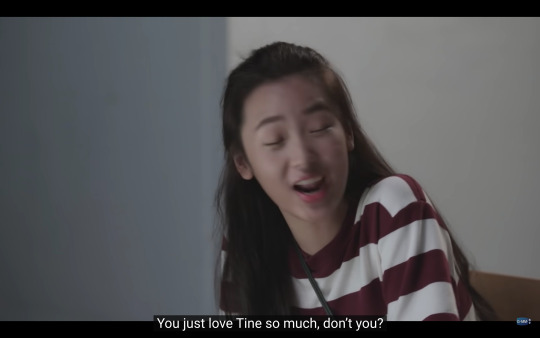
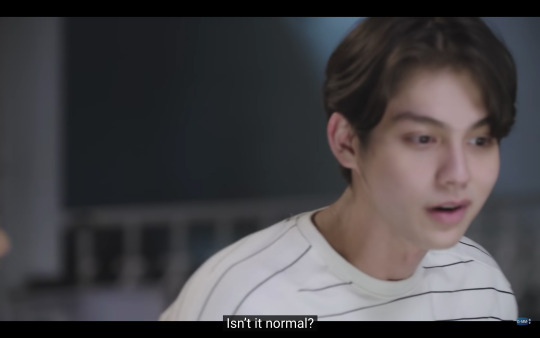
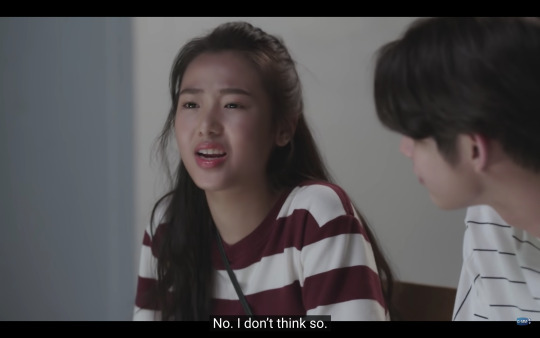
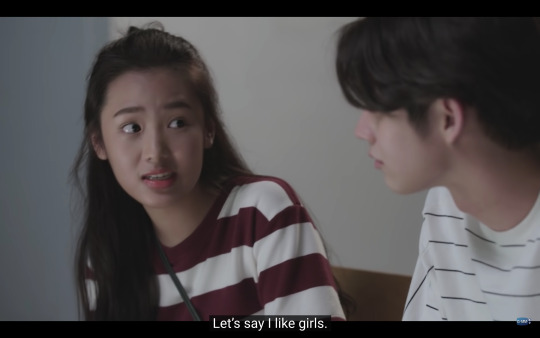

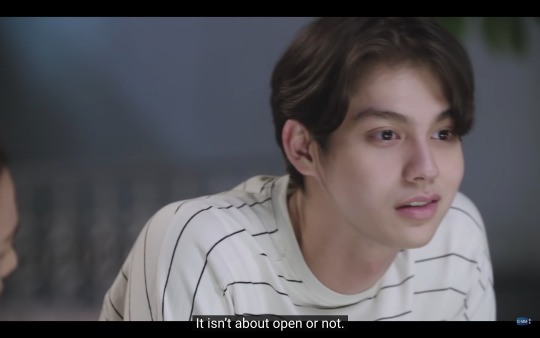
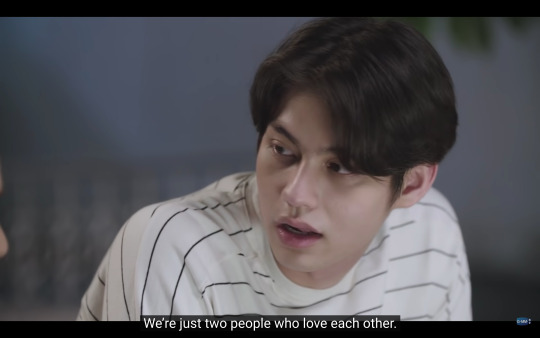
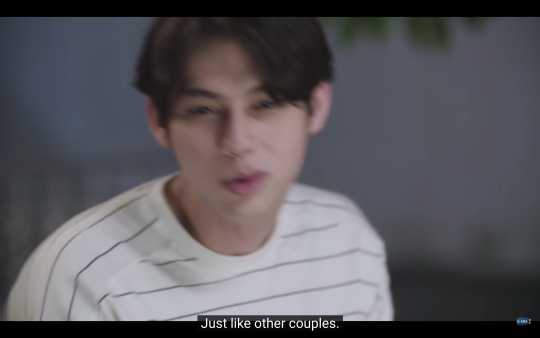
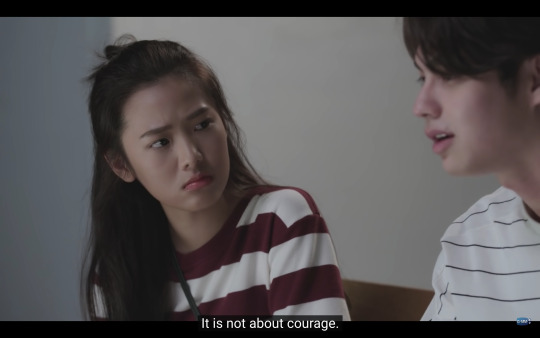
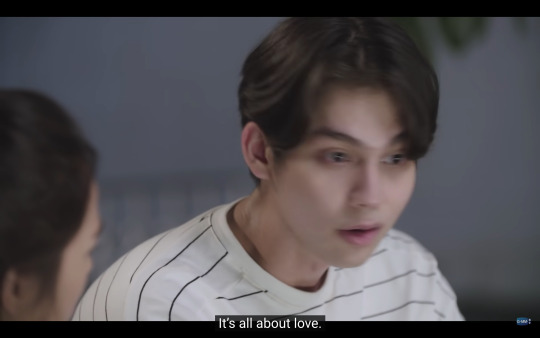
Like I said earlier: 2G gave potentially sex-and-queer-love-averse audiences a BL they could chew on. Win Metawin gave them enough by way of the portrayal to allow audiences to feel like they could be at arm’s-length while observing a same-sex relationship.
S2G, and Sarawat himself, strike to the HEART of queer existence and queer love. Sarawat corrects Earn: I do not love Tine because I’m courageous. I love Tine because I love Tine, because I am a human who loves another human. It’s nothing special. It’s just love that myself and my partner have, that other couples have.
I think what P’Aof did, by way of observing what was going down in 2G -- what was being NORMALIZED in 2G -- was to pull a switch and turn the tracks around, and say, I have got to normalize ANOTHER PATH for these fans that are paying extremely close attention to Bright and Win right now. And he did it, with rainbow tablecloths and shirts; with Tine’s homies, Fong and Ohm, holding Tine down; with Sarawat’s homies, Man and Boss, exploring their OWN loves simultaneously with Sarawat and holding Sarawat down with love and support.
Oh, and, of course. What P’Aof did with Green. Green was arguably a worst-case scenario of a gay character being misused for comedy in any of the dramas I’ve seen on the OGMMTVC in 2G. I honestly do NOT know what GMMTV was thinking when they allowed that characterization to air.
And Green just becomes... SASSY, and EQUAL, and really fun and slightly conniving towards Dim in S2G, and it was FABULOUS to watch (OMG. Guy and Guy’s chemistry and comedy? HILARIOUS. P’Aof ABSOLUTELY knew what he was doing there!).
Watching S2G was another fabulous P’Aof moment. It was like putting on warm pajamas and snuggling in for the smart ride of a drama. Every bad drama should consider having P’Aof come in to save the day (except for The Promise and Step By Step -- let’s never utter those titles ever again, ever).
But, I do need to give 2G credit. 2G opened the door for something: it served as a misstep for GMMTV to learn from. I don’t want to be SO summarizing like that -- again, because very important experts in @bengiyo and @so-much-yet-to-learn, who analyze shows from a very important queer lens, have spoken on the bright spots of 2G. 2G allowed for S2G to exist, for Sarawat to exist as an openly-in-love man with a boyfriend who he doted on. 2G allowed for fans of 2G to then walk the road in S2G, to be exposed to P’Aof’s CRITICAL and EMPATHIC eye in developing queer content, and to be exposed to a Sarawat that was much more able to LOVE and to receive love.
I’ll giggle and laugh at the foibles of 2G. But I saw how Bright, and even Win, improved in S2G. I saw how a director in P’Aof, and his screenwriting team in Pratchaya, Bee, and Au, took a thing that wasn’t representing the queer community healthily enough, and turned it into yet another gorgeous representation, not just of queer love -- but of GLOBAL LOVE, a kind of love, between Tine and Sarawat, that all of us humans who WANT to love another person, can strive for. I will always appreciate 2G and S2G for that journey.
[Alright, we keep truckin’! If you’ve been following my blog in the late-night space, well -- you know where I’m at, psychologically, at the moment. I was ALL KINDS OF MESSSEDDDDD UPPPPPPPPPP over I Told Sunset About You. GEEEEEEEEEEZZZZZ. I am really going to enjoy my ITSAY write-up, and will definitely serve up some comparative analysis between ITSAY and other shows, as per a request from the legendary @lurkingshan, I gotchu, gurl. I see some really important moments from the OGMMTVC journey in ITSAY and cannot wait to get my pen on them.
And speaking of wild and crazy mindsets, I have started YYY -- more on THAT in the liveblogs -- and then after YYY, a return to dear MaxTul. We’ll definitely honor the end of Tul Pakorn’s career as I watch Manner of Death for the first time. Tul’s been a real homey in the space for a while, and I can’t wait to celebrate him.
Here’s the status of the watchlist -- as always, I’ll take any feedback ya got!
1) Love Sick and Love Sick 2 (2014 and 2015) (review here)
2) Make It Right (2016) (review here)
3) SOTUS (2016-2017) (review here)
4) Make It Right 2 (2017) (review here)
5) Together With Me (2017) (review here)
6) SOTUS S/Our Skyy x SOTUS (2017-2018) (review here)
7) Love By Chance (2018) (review here)
8) Kiss Me Again: PeteKao cuts (2018) (no review)
9) He’s Coming To Me (2019) (review here)
10) Dark Blue Kiss (2019) and Our Skyy x Kiss Me Again (2018) (review here)
11) TharnType (2019-2020) (review here)
12) Senior Secret Love: Puppy Honey (BL cuts) (2016 and 2017) (I’m watching this out of order just to get familiar with OffGun before Theory of Love -- will likely not review)
13) Theory of Love (2019) (review here)
14) 3 Will Be Free (2019) (not a BL or an official part of the OGMMTVC watchlist, but an important harbinger of things to come in 2019 and beyond re: Jojo Tichakorn pushing queer content in non-BLs) (review here)
15) Dew the Movie (2019) (review here)
16) Until We Meet Again (2019-2020) (review here)
17) 2gether (2020) and Still 2gether (2020)
18) I Told Sunset About You (2020) (review coming)
19) YYY (2020, out of chronological order) (watching)
20) Manner of Death (2020-2021) (not a true BL, but a MaxTul queer/gay romance set within a genre-based show that likely influenced Not Me and KinnPorsche)
21) A Tale of Thousand Stars (2021) (review here)
22) A Tale of Thousand Stars (2021) OGMMTVC Fastest Rewatch Known To Humankind For The Sake Of Rewatching Our Skyy 2 x BBS x ATOTS
23) Lovely Writer (2021)
24) Last Twilight in Phuket (2021) (the mini-special before IPYTM)
25) I Promised You the Moon (2021)
26) Not Me (2021-2022)
27) Bad Buddy (2021-2022) (thesis here)
28) Bad Buddy (2021-2022) and Our Skyy 2 x BBS x ATOTS (2023) OGMMTVC Rewatch
29) Secret Crush On You (2022) [watching for Cheewin’s trajectory of studying queer joy from Make It Right (high school), to SCOY (college), to Bed Friend (working adults)]
30) KinnPorsche (2022) (tag here)
31) KinnPorsche (2022) OGMMTVC Fastest Rewatch Known To Humankind For The Sake of Re-Analyzing the KP Cultural Zeitgeist
32) The Eclipse (2022) (tag here)
33) GAP (2022-2023) (Thailand’s first GL)
34) My School President (2022-2023) and Our Skyy 2 x My School President (2023)
35) Moonlight Chicken (2023) (tag here)
36) Bed Friend (2023) (tag here) (Cheewin’s latest show, depicting a queer joy journey among working adults)]
#2gether#2gether meta#still 2gether#still 2gether meta#bright vachirawit#win metawin#brightwin#tine x wat#wat x tine#tine x sarawat#sarawat x tine#tinewat#backaof noppharnach#turtles catches up with old gmmtv#turtles catches up with thai BLs#turtles catches up with the essential BLs#the old gmmtv challenge#ogmmtvc#sex in asian media#sex and BL fandoms#film rachanun#love pattranite#aof noppharnach
100 notes
·
View notes
Text
Shared + spotted in: My Ride, Till the World Ends, Midnight Musuem, 2 Moons 3: The Ambassador, Bad Romance, Club Sapan Fine 2, I Feel You Linger in the Air's official trailer, My Ride, Meow Ears Up, Still 2gether, Midnight Motel, TharnType2 and Catch Me Baby
IRL: The TEPP, 88 Khang Rong Wai Alley, Bang Na Tai, Bang Na, Bangkok 10260, Thailand
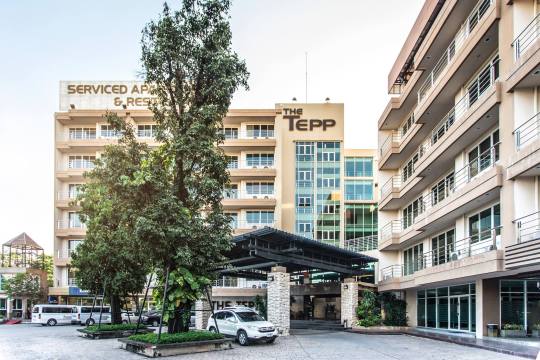
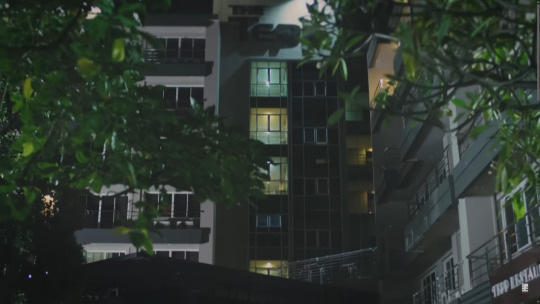
My Ride, Till the World Ends and Midnight Musuem


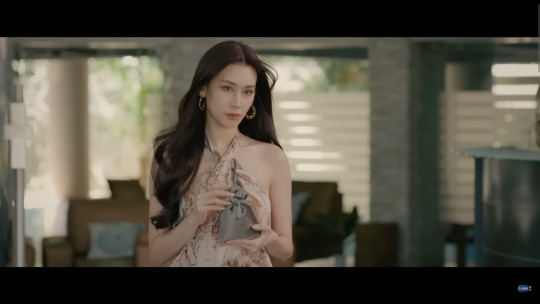

Single Suite or Single Grand Suite or Double Suite seen in Till the World Ends


Triple Suite seen in 2 Moons 3: The Ambassador, Bad Romance, Club Sapan Fine 2, I Feel You Linger in the Air's official trailer, My Ride, Meow Ears Up, Still 2gether and Midnight Motel
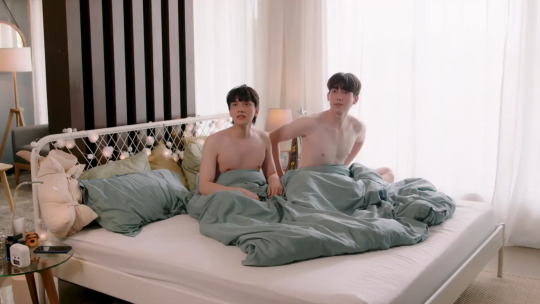



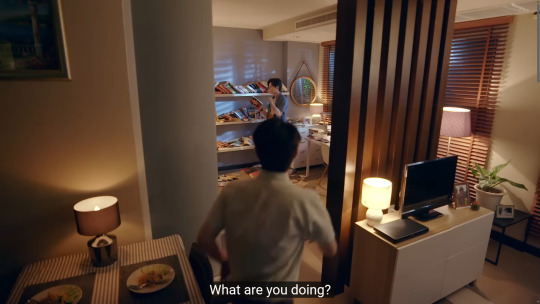


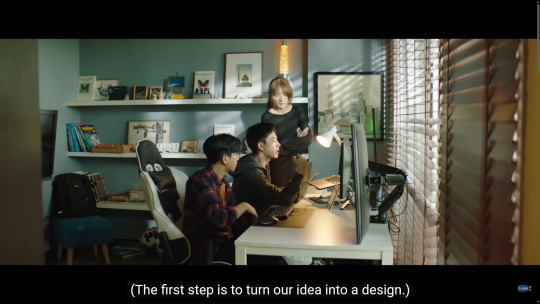

Triple Executive Suite seen in 2 Moons 3: The Ambassador, Midnight Museum, TharnType2, Catch Me Baby and Till the World Ends






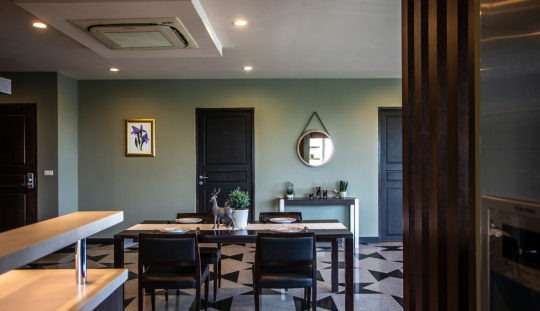
Credit: https://www.facebook.com/thetepp/photos
Credit: https://thetepp.com/rooms/triple-executive-suite/
#shared + spotted in thai (mostly) ql#my ride the series#till the world ends#midnight museum#2 moons 3#2 moons 3: the ambassador#bad romance the series#club sapan fine 2#i feel you linger in the air#ifylita#meow ears up#still 2gether#midnight motel#tharntype 2#catch me baby#irl locations
15 notes
·
View notes
Text
GMMTV BL Tournament - Round 1
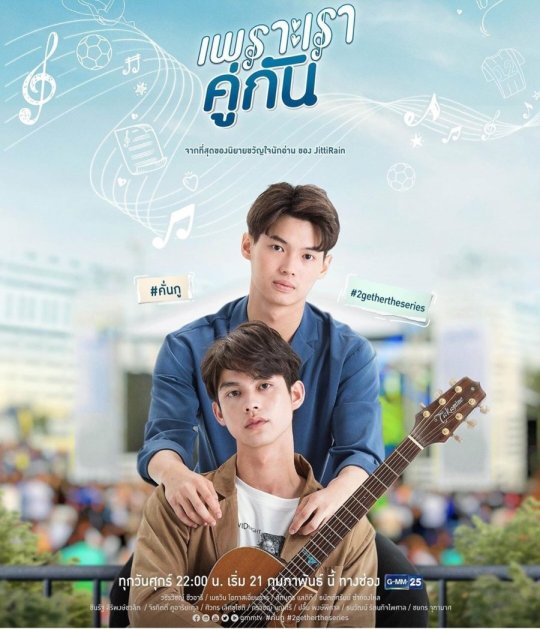

#2gether#2gether the series#still 2gether#sky in your heart#sky in you heart the series#gmmtv#thai bl#thai drama#bl drama#polls#round 1
38 notes
·
View notes
Text
That's dangerous~metawin!
The wink could kill~!
15 notes
·
View notes
Text

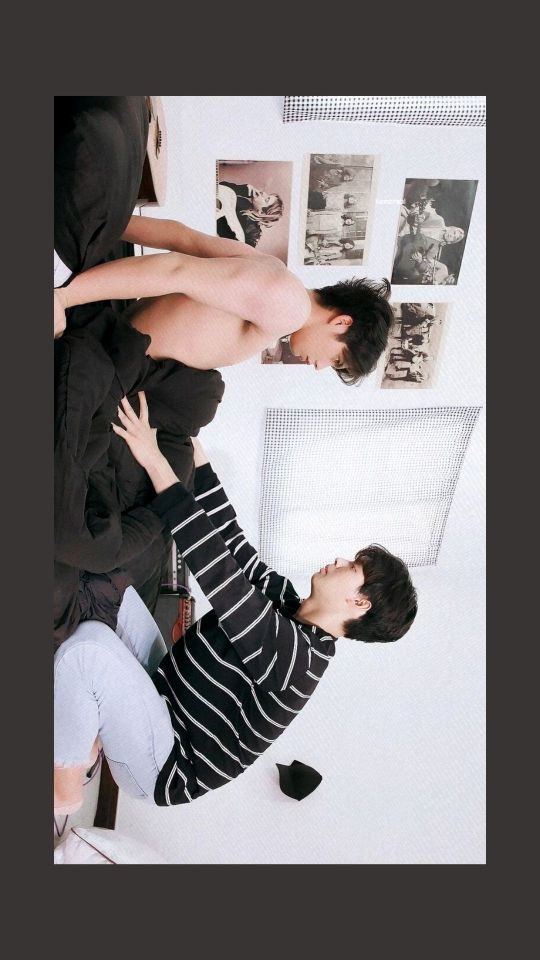
-¿Por qué duermes desnudo? Por lo menos te hubieras puesto ropa interior.
-¿No me pude nada? Eso significa... ¿me viste por completo?
#Sarawat & Tine#2gether#2gether the series#still 2gether#2gether sarawat#2gether tine#win metawin#thai drama#bl ships#asianlgbtqdramas#asian lgbtq dramas#bl drama#love#bl series#lgbtlove#bright vachirawit#gmmtv series#gmmtv boys#gmmtv#gmmtv bl#gmmtv actors#thai series#bl shows#bl story#brightwin#thai bl series#thai bl drama#thai bl actors#thai bl#thai actors
11 notes
·
View notes
Text
SOME TINE-WAT MOMENTS ●'◡'●


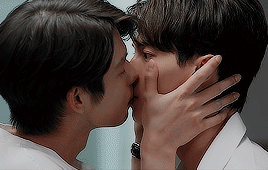

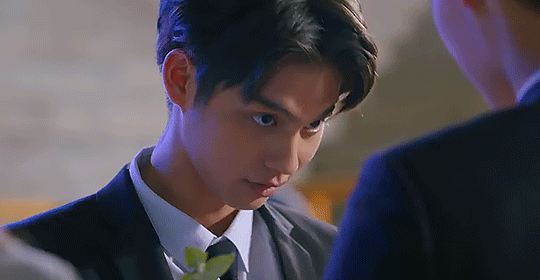
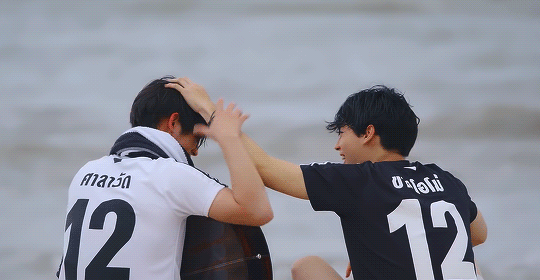


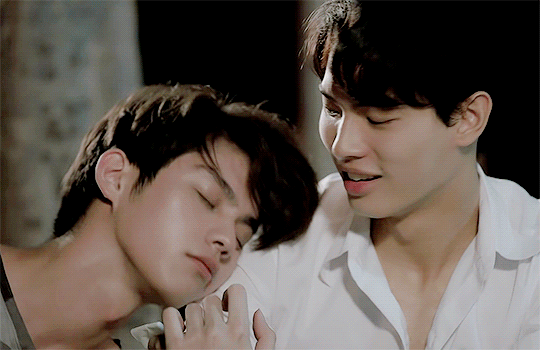
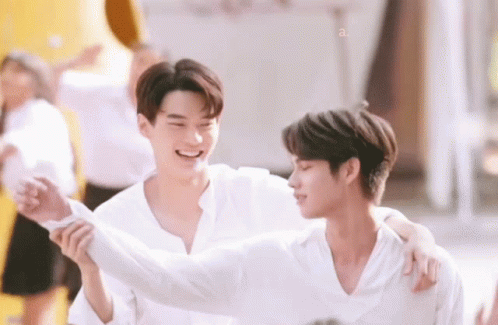
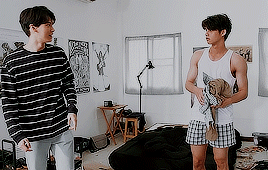


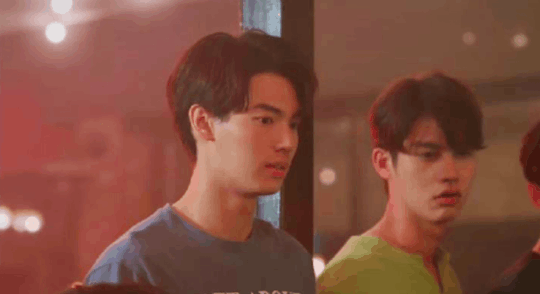
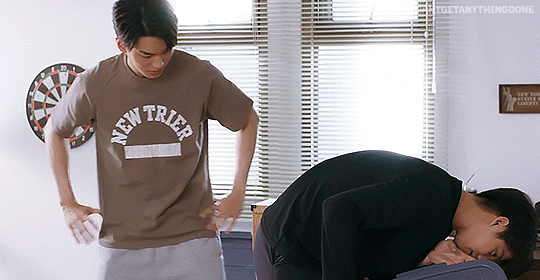
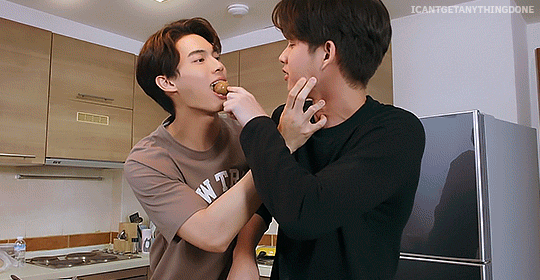
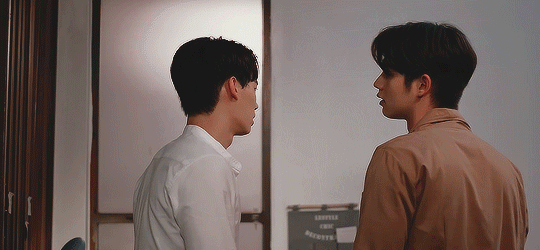
#2gether#2gether the series#brightwin#sarawatine#gay kiss#bxb rp#boy love#lgbt pride#lgbtq#still 2gether#thailand#thai bl#thai drama#thai boys love#wholesome memes#lovecore#moment#holy fuck#asian drama#web series#bl series
310 notes
·
View notes